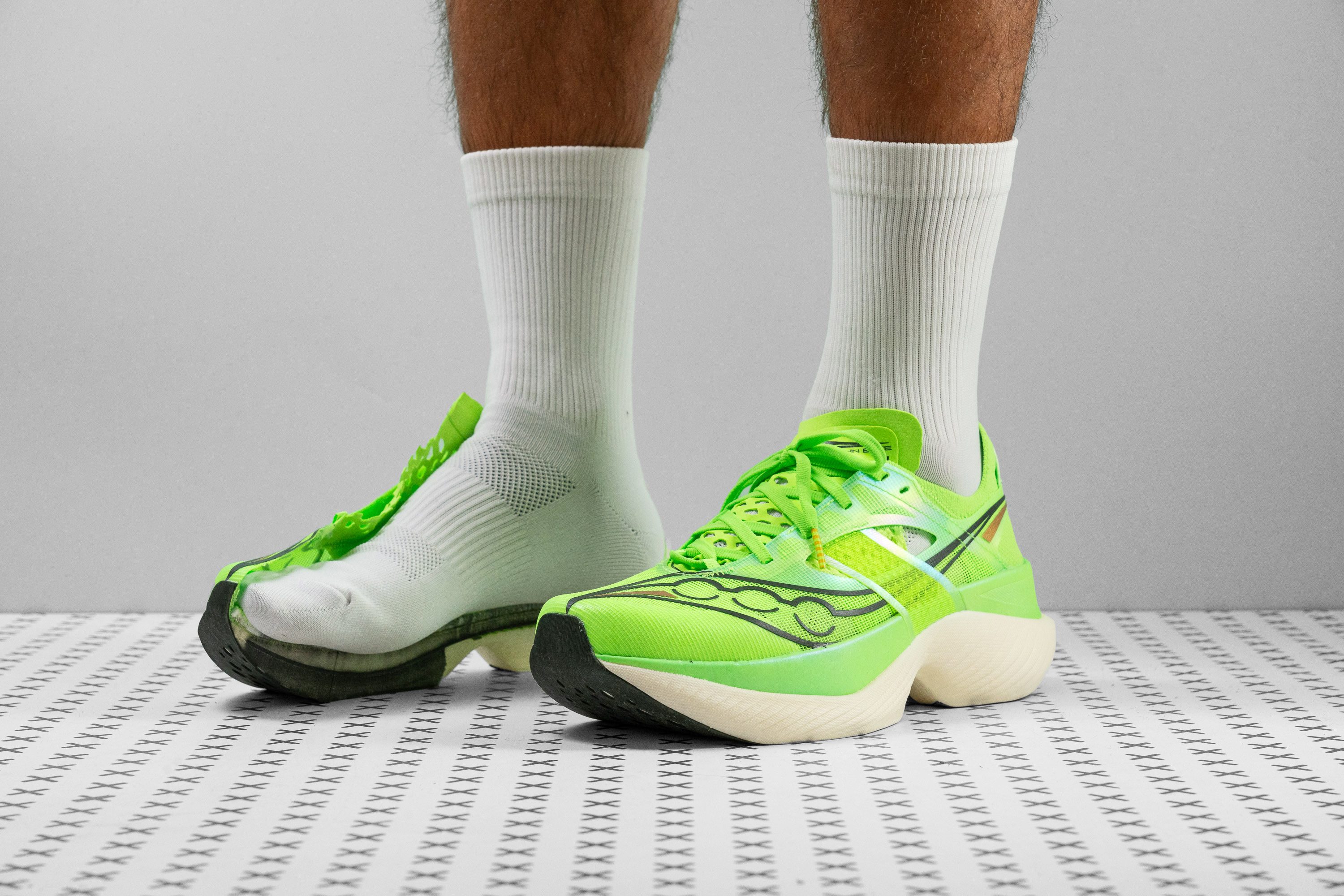Our verdict
Pros
- The finest Saucony racer yet
- Remarkably lightweight
- Impressively stable
- Wide toebox
- Ideal for marathons
- Excellent foot lockdown
- Exceptional energy return from PWRRUN HG
- Superb grip in both wet and dry conditions
Cons
- Priced on the higher side at $275
- Not the best pick for heel strikers
Audience verdict
- Top 20% in road running shoes
- Top 22% in Saucony running shoes
- Top 13% most popular running shoes
Comparison
The most similar running shoes compared
+ + Add a shoe | |||||
|---|---|---|---|---|---|
| Audience score | 90 Great! | 81 Good! | 91 Superb! | 89 Great! | |
| Price | $275 | $285 | $225 | $250 | |
| Pace | Competition | Competition | Competition | Competition | |
| Arch support | Neutral | Neutral | Neutral | Neutral | |
| Weight lab Weight brand | 7.2 oz / 203g 7.2 oz / 204g | 7.1 oz / 201g 7 oz / 198g | 7.8 oz / 220g 7.7 oz / 218g | 7.7 oz / 218g 7.9 oz / 223g | |
| Lightweight | ✓ | ✓ | ✓ | ✓ | |
| Drop lab Drop brand | 8.0 mm 8.0 mm | 8.5 mm 8.0 mm | 9.5 mm 8.0 mm | 8.0 mm 6.5 mm | |
| Strike pattern | HeelMid/forefoot | HeelMid/forefoot | HeelMid/forefoot | HeelMid/forefoot | |
| Midsole softness | Soft | Soft | Balanced | Balanced | |
| Difference in midsole softness in cold | Small | Small | Small | Small | |
| Toebox durability | Bad | Bad | Good | Bad | |
| Heel padding durability | Good | Good | Good | Good | |
| Outsole durability | Good | Bad | Good | Good | |
| Breathability | Breathable | Breathable | Breathable | Breathable | |
| Toebox width at the widest part | Medium | Medium | Medium | Medium | |
| Toebox width at the big toe | Medium | Medium | Medium | Medium | |
| Stiffness | Stiff | Stiff | Stiff | Stiff | |
| Difference in stiffness in cold | Small | Small | Small | Small | |
| Torsional rigidity | Stiff | Stiff | Stiff | Stiff | |
| Heel counter stiffness | Flexible | Flexible | Flexible | Flexible | |
| Plate | Carbon plate | Carbon plate | Carbon plate | Carbon plate | |
| Rocker | ✓ | ✓ | ✓ | ✓ | |
| Heel lab Heel brand | 39.9 mm 40.0 mm | 38.1 mm 40.0 mm | 38.1 mm 40.0 mm | 37.8 mm 39.5 mm | |
| Forefoot lab Forefoot brand | 31.9 mm 32.0 mm | 29.6 mm 32.0 mm | 28.6 mm 32.0 mm | 29.8 mm 33.0 mm | |
| Widths available | Normal | Normal | Normal | Normal | |
| Orthotic friendly | ✓ | ✗ | ✓ | ✓ | |
| Season | SummerAll seasons | SummerAll seasons | SummerAll seasons | SummerAll seasons | |
| Removable insole | ✓ | ✗ | ✓ | ✓ | |
| Ranking | #43 Top 17% | #236 Bottom 9% | #21 Top 9% | #73 Top 29% | |
| Popularity | #32 Top 13% | #7 Top 3% | #31 Top 12% | #78 Top 30% |
Who should buy
From our angle, the Saucony Endorphin Elite is an ideal choice for:
- Those who feel that most racing shoes are too snug.
- Runners who want the most cushioning that still meets World Athletics regulations.
- Midfoot and forefoot strikers aiming for a competition shoe versatile enough to race anywhere from a 5K to a marathon.
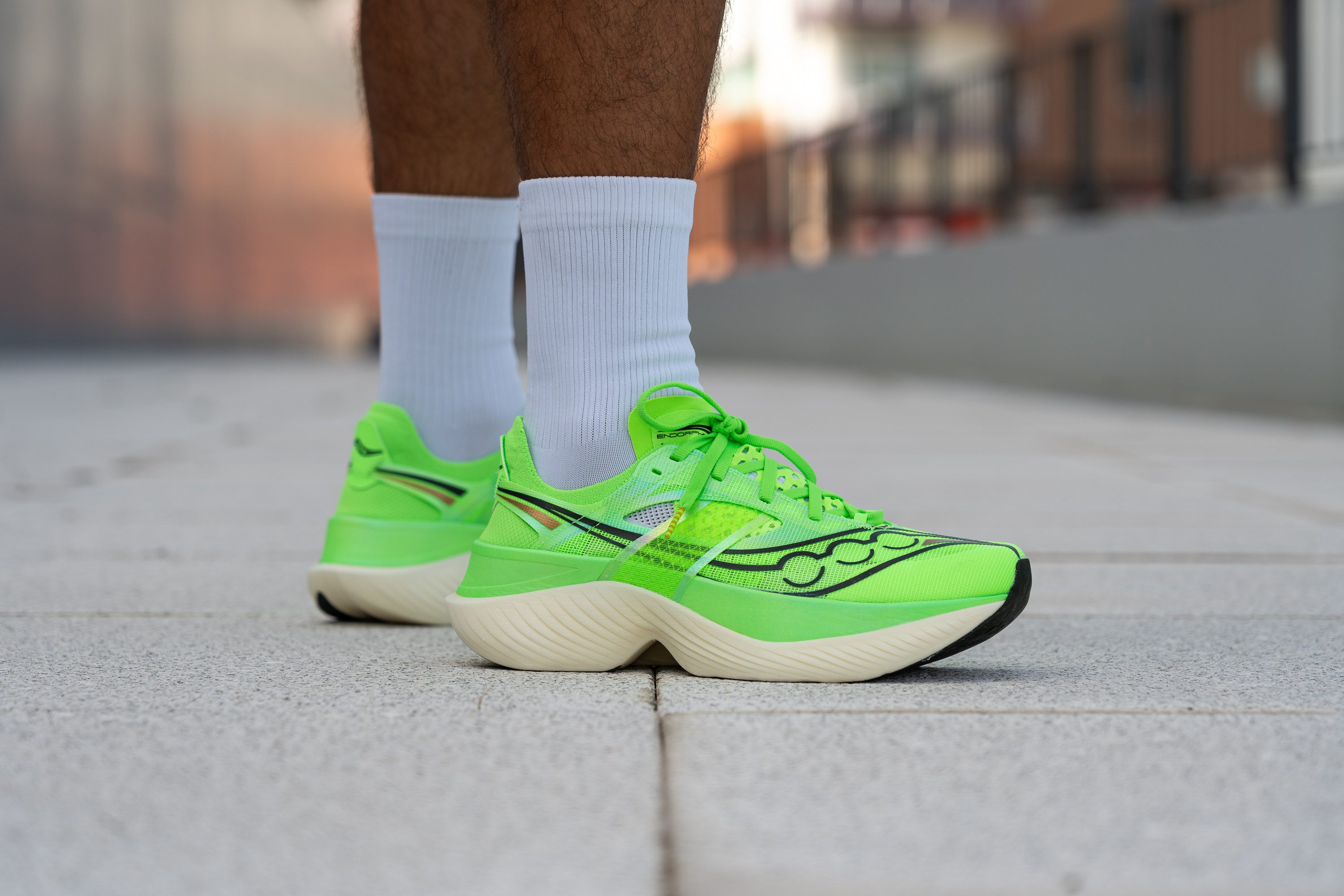
Who should NOT buy
The Endorphin Elite is a standout shoe, but it's best for those who like a firmer feel underfoot. If you're seeking a more cushioned race experience, we suggest considering the Nike Alphafly 2. It's been a favorite in the lab for its plush ride.
For those not willing to spend $275, there are other options worth exploring. Racing shoes like the ASICS Metaspeed Sky+ and the Adidas Adizero Adios Pro 3 deliver a performance that's similar to the Elite but at a slightly lower price point. We consider these alternatives offer better value for their cost.
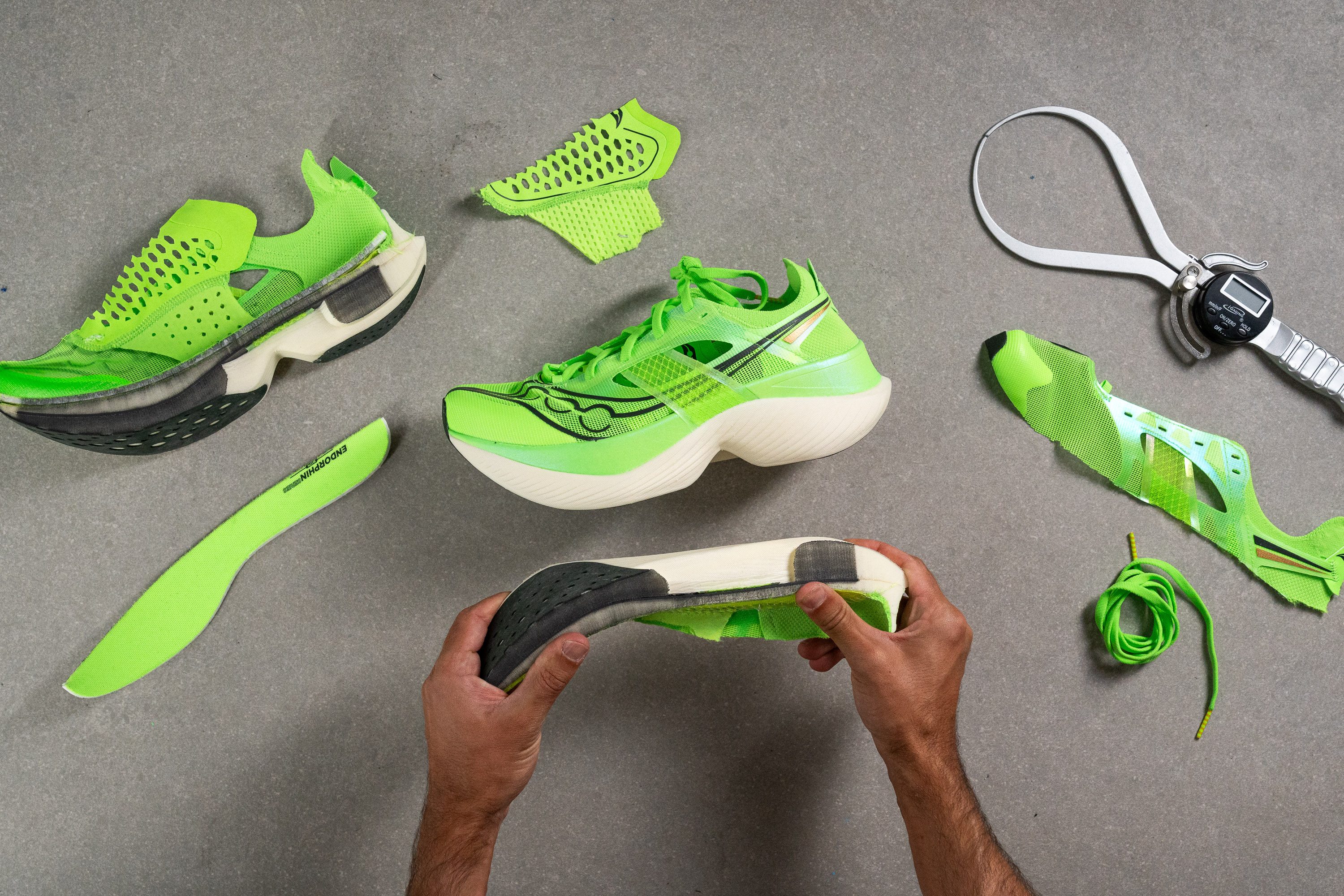
Breathability
The last thing we all want during a race is for our feet to feel like they're boiling, especially in a marathon. That's why we aim here for nothing less than a 5/5 score in our breathability test—and the Saucony Endorphin Elite didn't disappoint.
We noticed an ultra-thin mesh upper with a tongue that features large holes. This design lets air flow freely, making it one of the best shoes we've come across in this aspect.
Holding the upper up to the light, the outstanding breathability becomes even more apparent. The holes in the tongue and medial zone are truly impressive, and the toebox is also highly breathable.
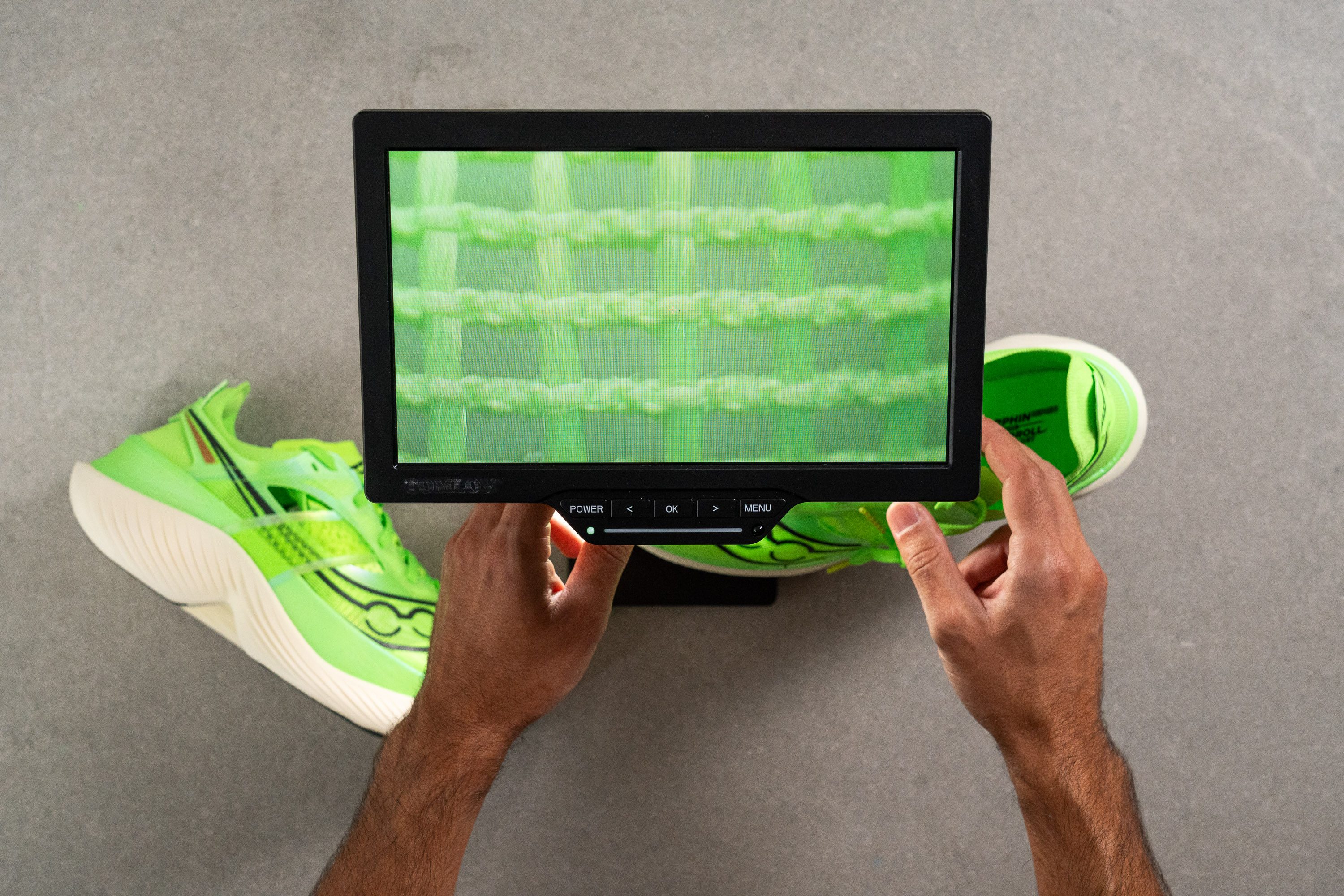
To get a closer look at the toebox, we used our microscope—one of our favorite tests here in the lab. What we saw confirmed our earlier observations.
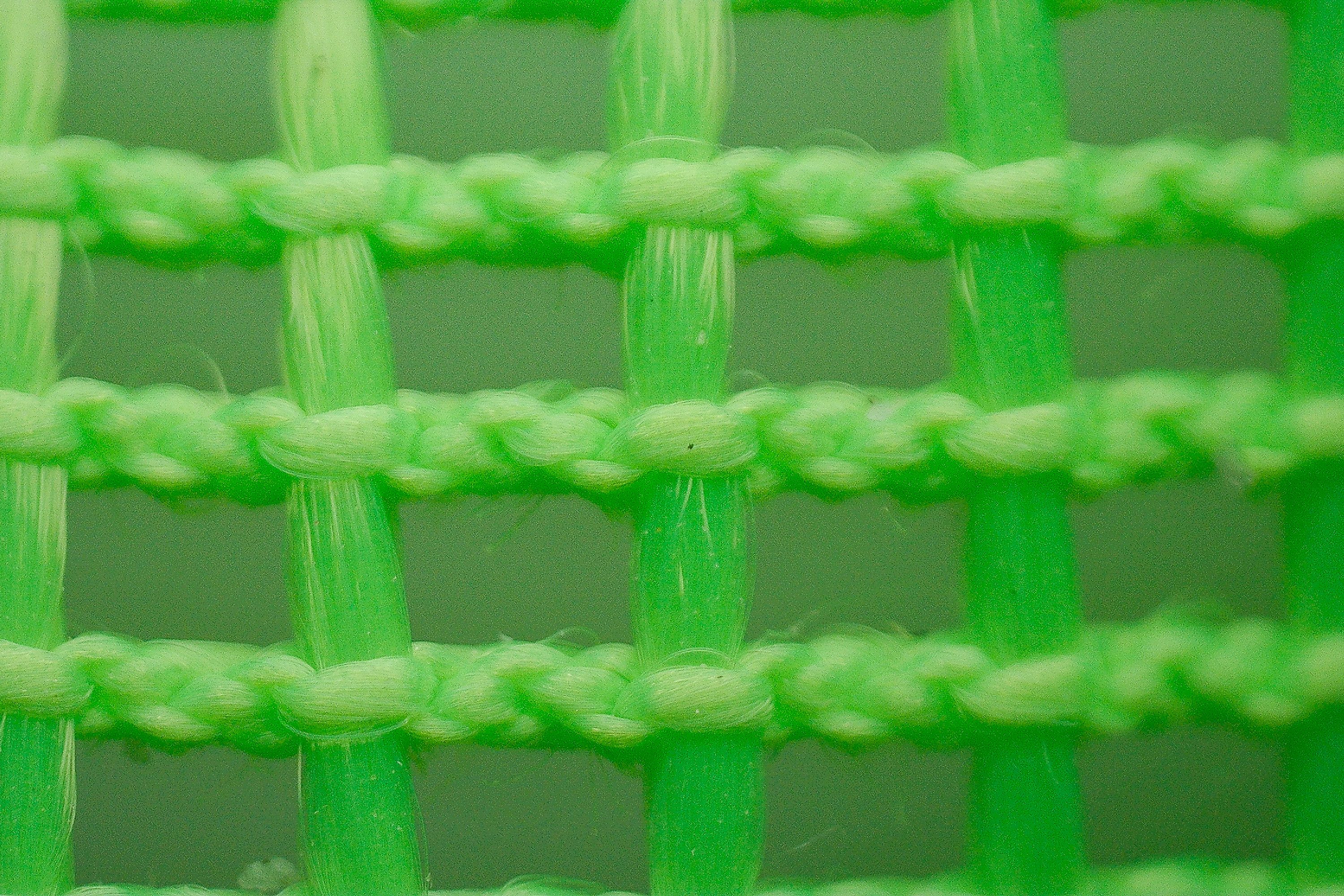
And as if that wasn't enough, the upper has several cut-outs to reduce weight and further boost breathability. We were almost tempted to rate it a 6/5, but of course, that's not possible!
| Endorphin Elite | 5 |
| Average | 3.8 |
Durability
Toebox durability
It might seem surprising to you, but we've found in the lab that the most expensive shoes on the market often don't offer the best durability. After testing the Endorphin Elite—priced at $275—in our lab with the dremel, we measured its durability at a mere 1/5.
The Elite couldn't even hang in there for a full 4 seconds of our test!
This is just how most racing shoes shoes are designed. They prioritize top performance, which often comes at the expense of toughness.
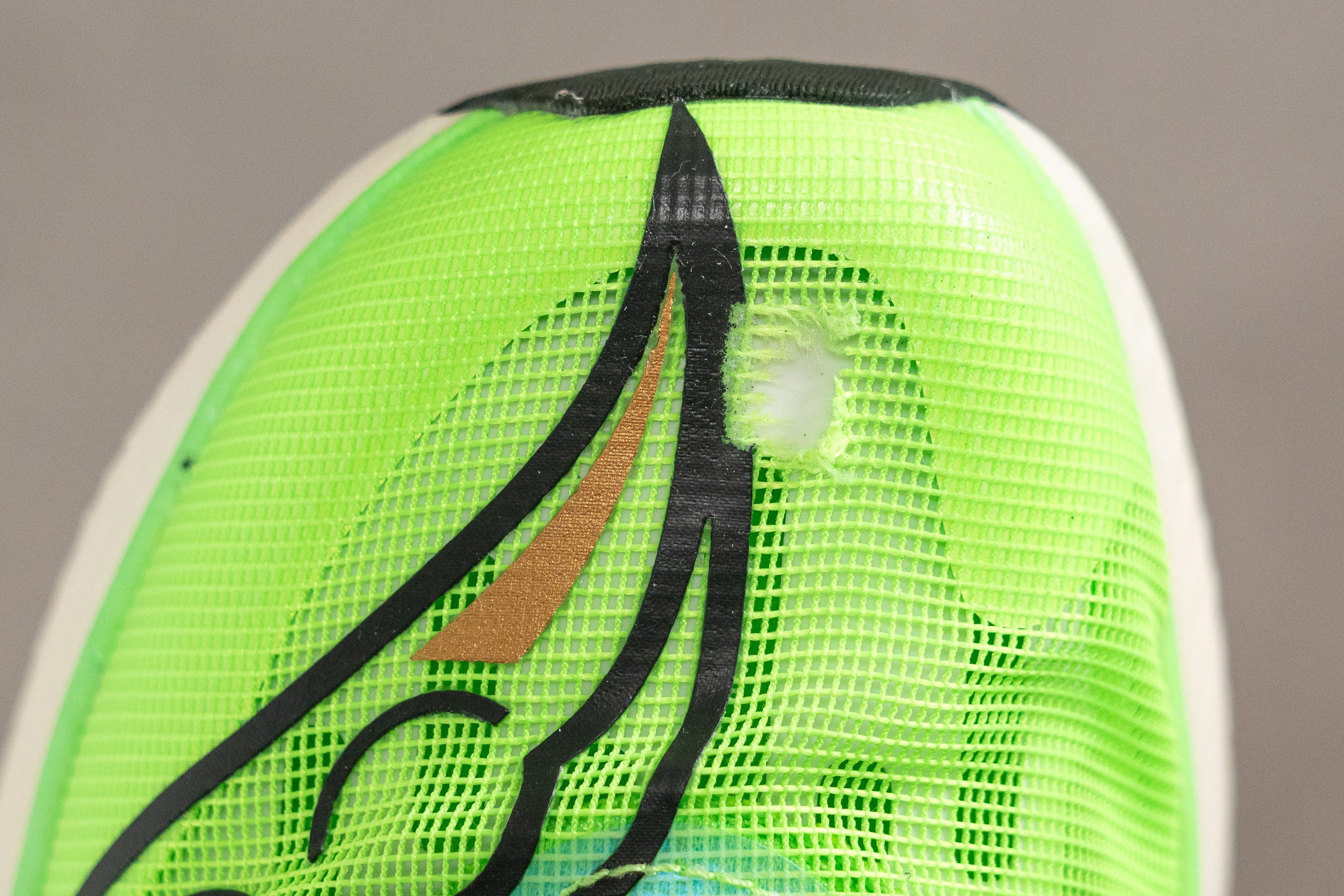
| Endorphin Elite | 1 |
| Average | 2.5 |
Heel padding durability
Compared to the toebox, the heel is impressively robust—and there's a smart reason behind it.
Daily trainers often have a plush heel for added comfort, but competition shoes, aiming for lightness, feature minimal and firmer padding, less prone to wear out. And that's exactly why this shoe earned a solid 4/5 on our test.
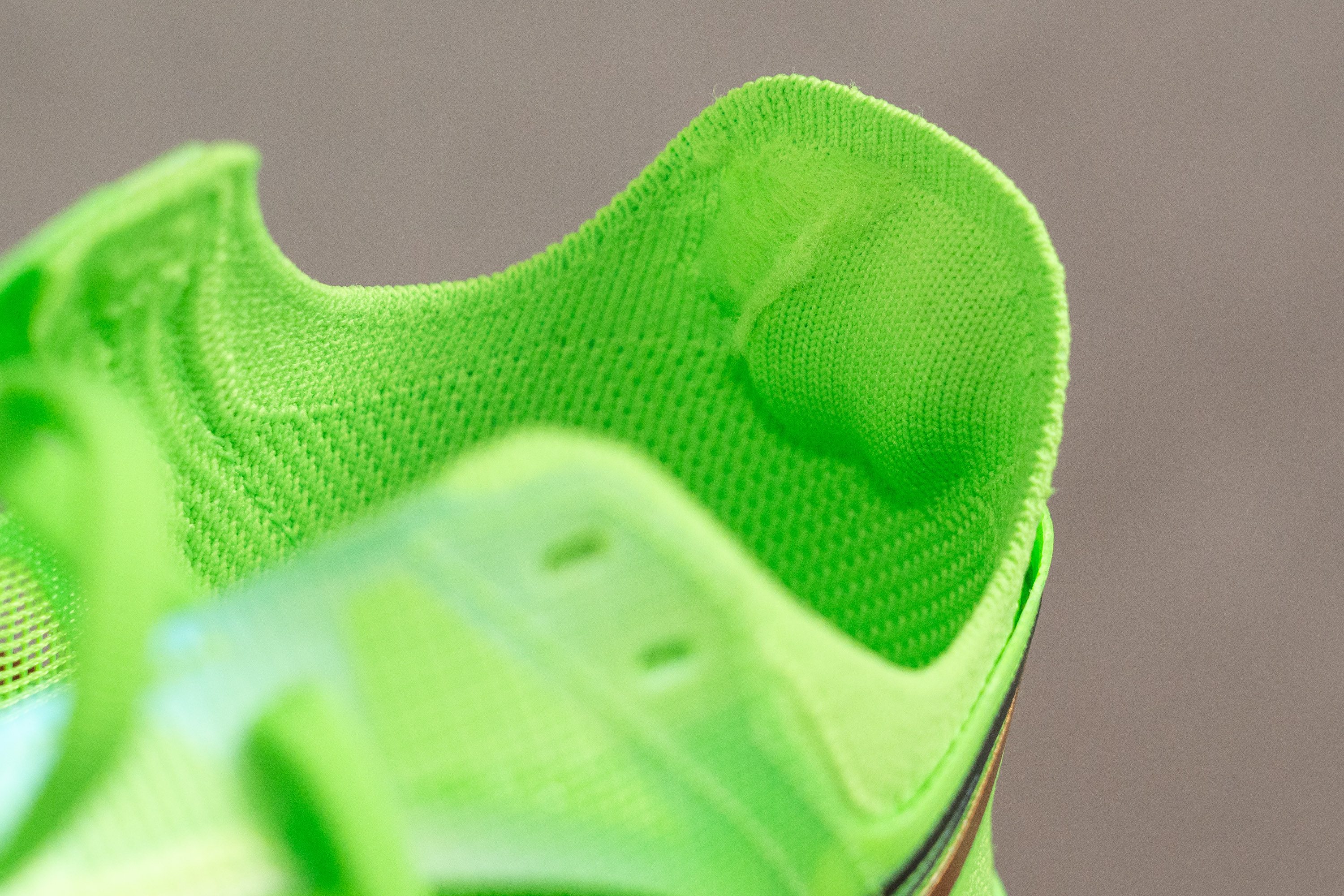
| Endorphin Elite | 4 |
| Average | 3.3 |
Outsole hardness
The outsole is laser-focused on traction and performance. With smartly-positioned rubber covering high-wear areas and numerous cutouts for weight-saving and better grip in wet conditions, it's all about optimization.
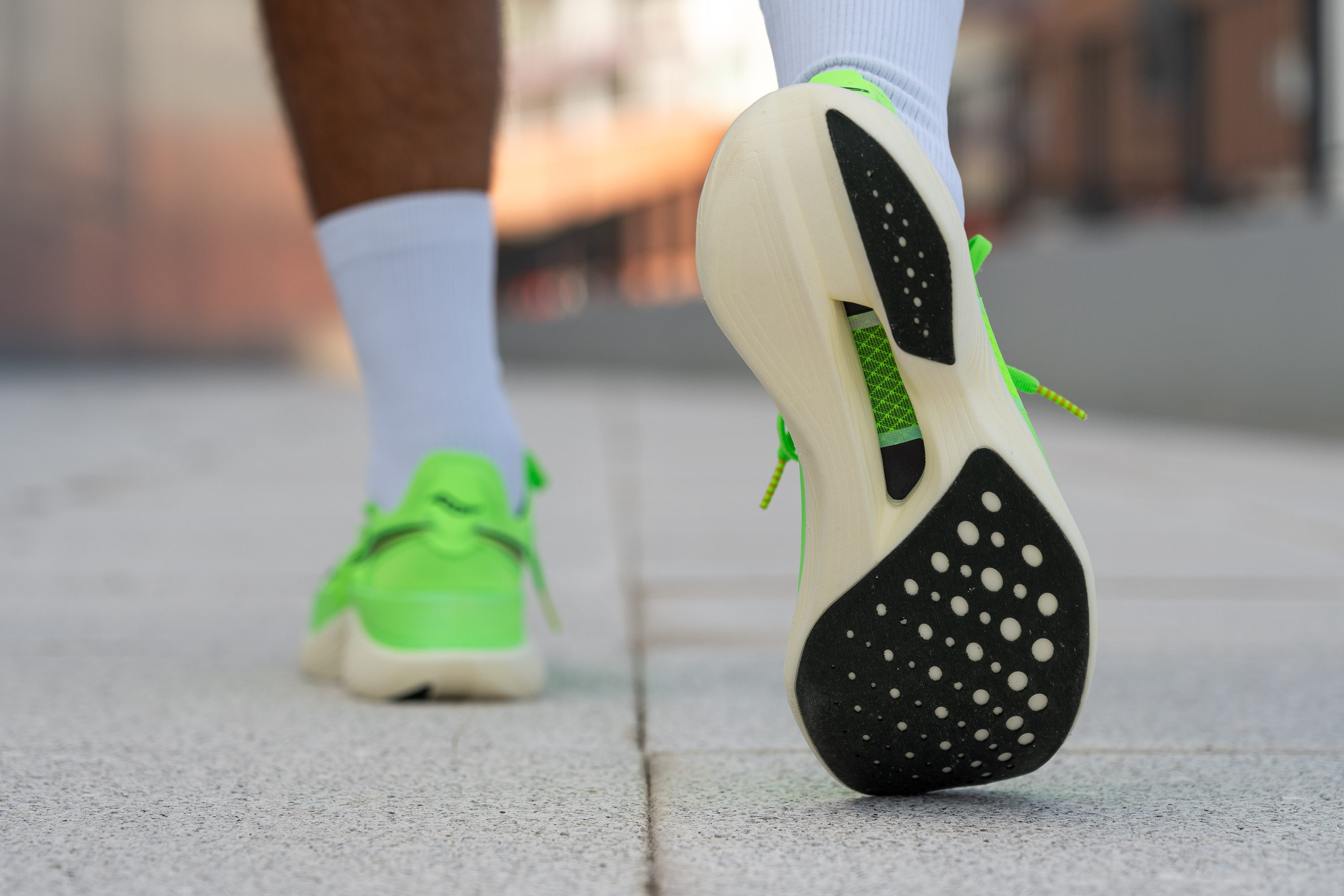
We've got to mention its magnificent grip. With a 63.1 HC reading in our durometer, it's among the softest results we've recorded. The Endorphin Elite feels much like the soft tires on a Formula 1 race car.
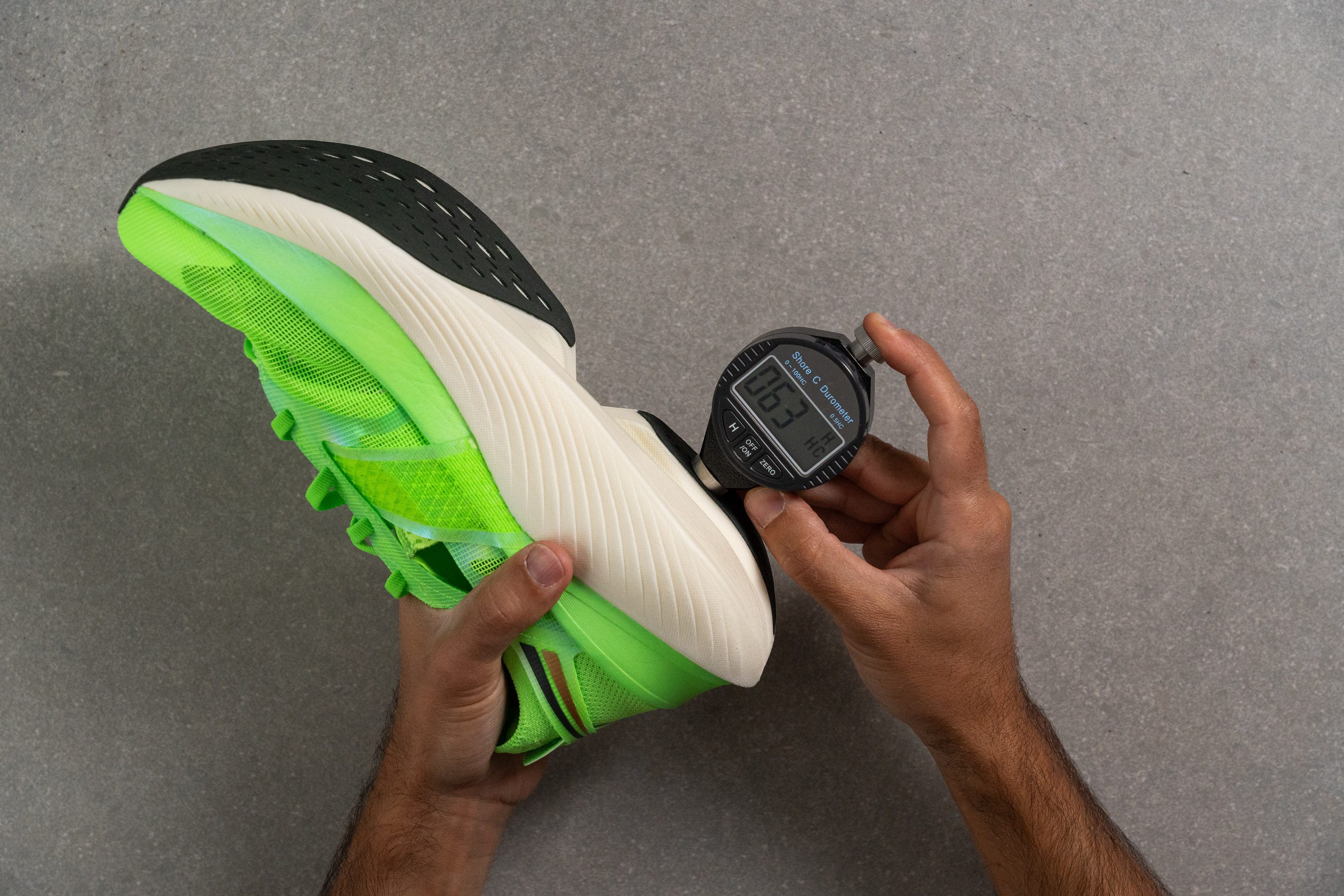
| Endorphin Elite | 63.1 HC |
| Average | 80.1 HC |
Outsole durability
The rubber Saucony uses is incredibly grippy and impressively durable.
We were pleasantly surprised by the results; our dremel only managed a tiny 0.2-mm dent!
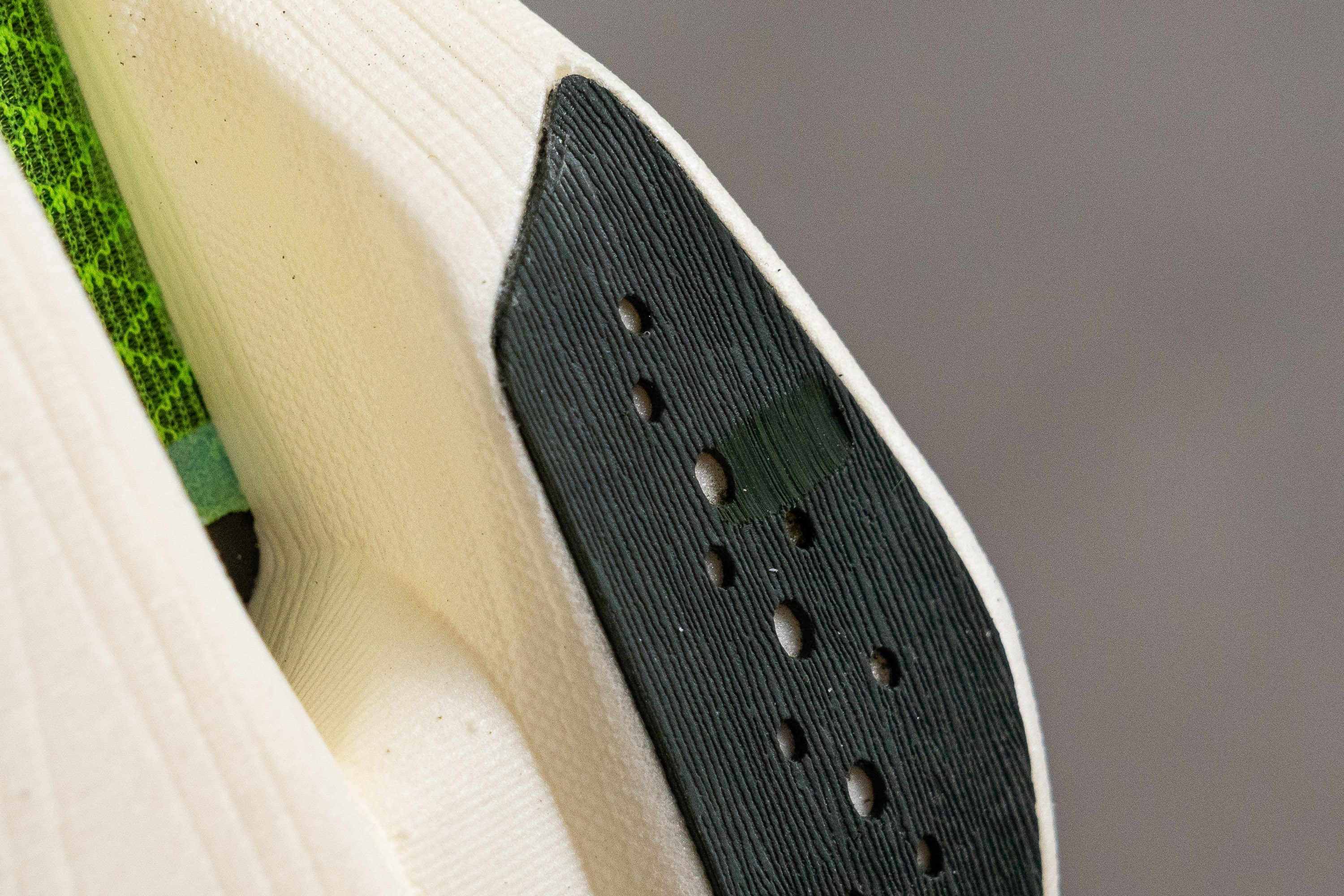
| Endorphin Elite | 0.2 mm |
| Average | 0.9 mm |
Outsole thickness
The shoe has just 1.4 mm of rubber. At first glance, it might not seem like much, but we found that it's more than enough based on the previous test.
In performance-oriented shoes, maximizing bouncy foam to the World Athletics' 40-mm limit gives the advantage, and thicker rubber would counteract this benefit. So, while it may look deceiving in our lab tests, less rubber is actually a good thing for race day.
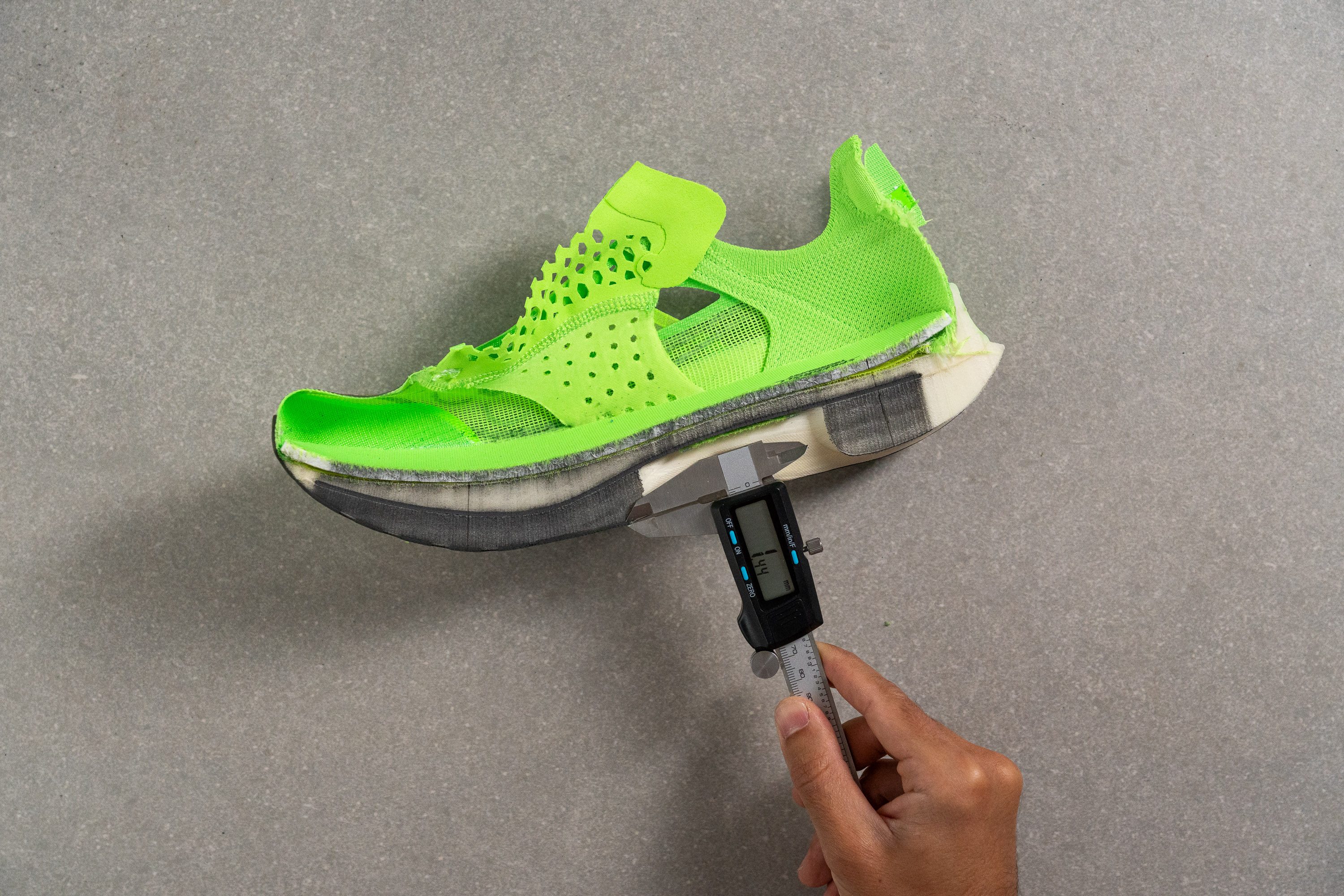
| Endorphin Elite | 1.4 mm |
| Average | 3.2 mm |
Weight
Weighing in at a respectable 7.2 oz (203g), it might not claim the title of the absolute lightest supershoe out there.
However, it's just an ounce heavier than its sibling, the Endorphin Pro 3 in a US 9. What's impressive is the generous amount of foam cushioning it packs underfoot, giving runners that plush feel.
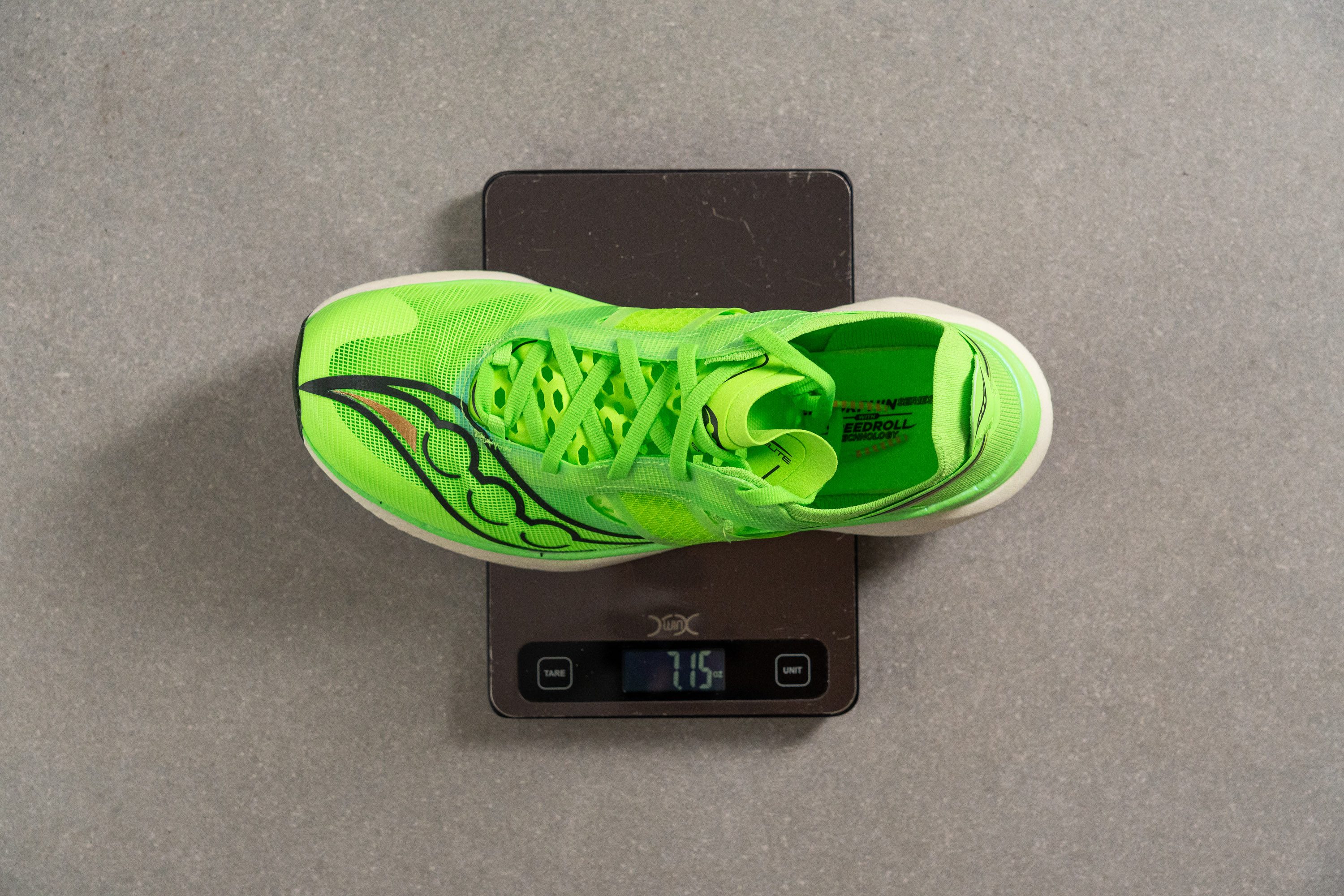
| Endorphin Elite | 7.16 oz (203g) |
| Average | 9.35 oz (265g) |
Cushioning
Heel stack
The Saucony Endorphin Pro 3 already had a solid reputation as a race-day shoe. However, marathoners were aware it lagged slightly behind the best racing shoes out there, especially in terms of stack height.
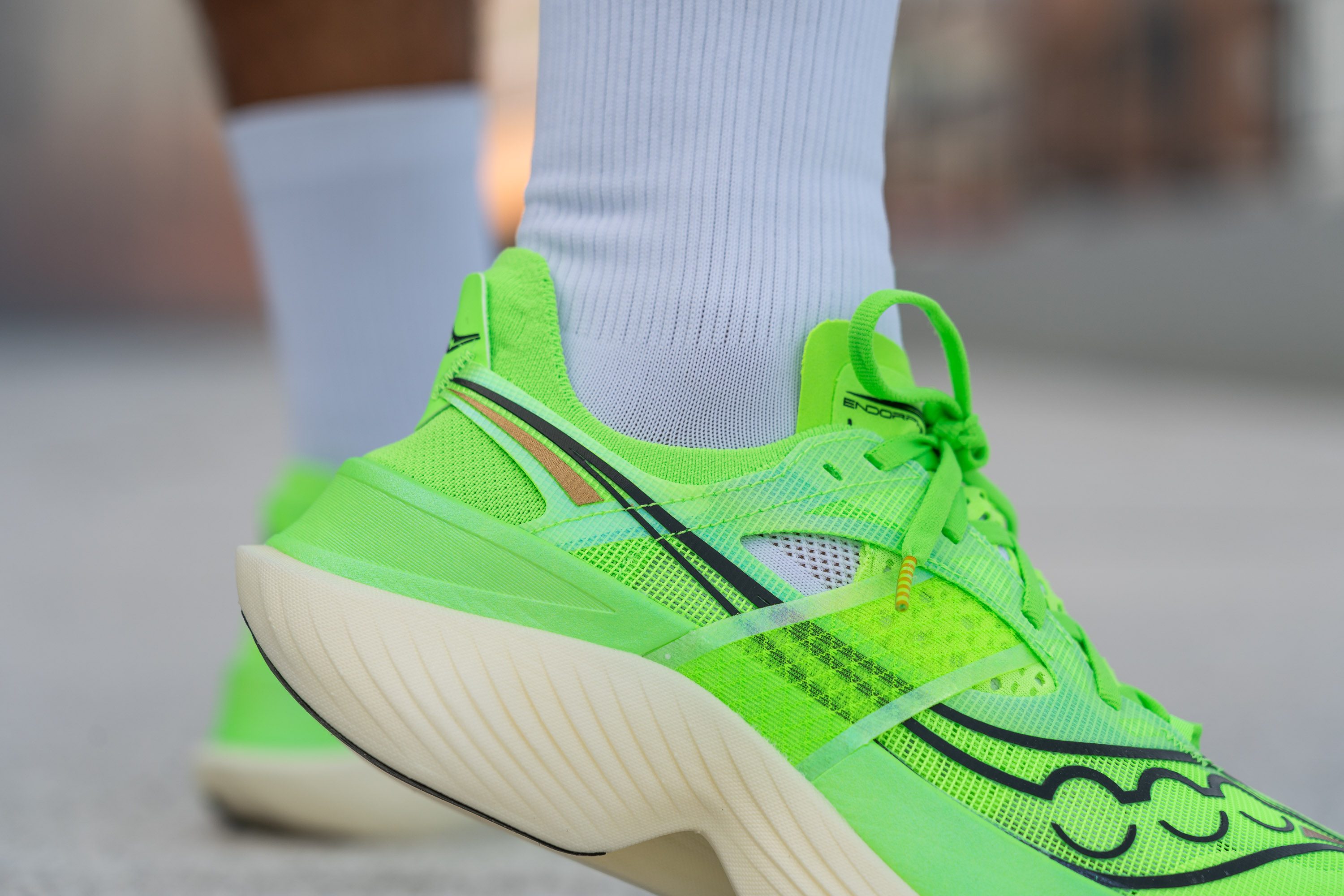
In our lab, we measured the Elite and found that Saucony came incredibly close, with a stack height of 39.9 mm—just a hair away from the maximum. This is fantastic news for runners, especially when pushing through the final 10K of a marathon!
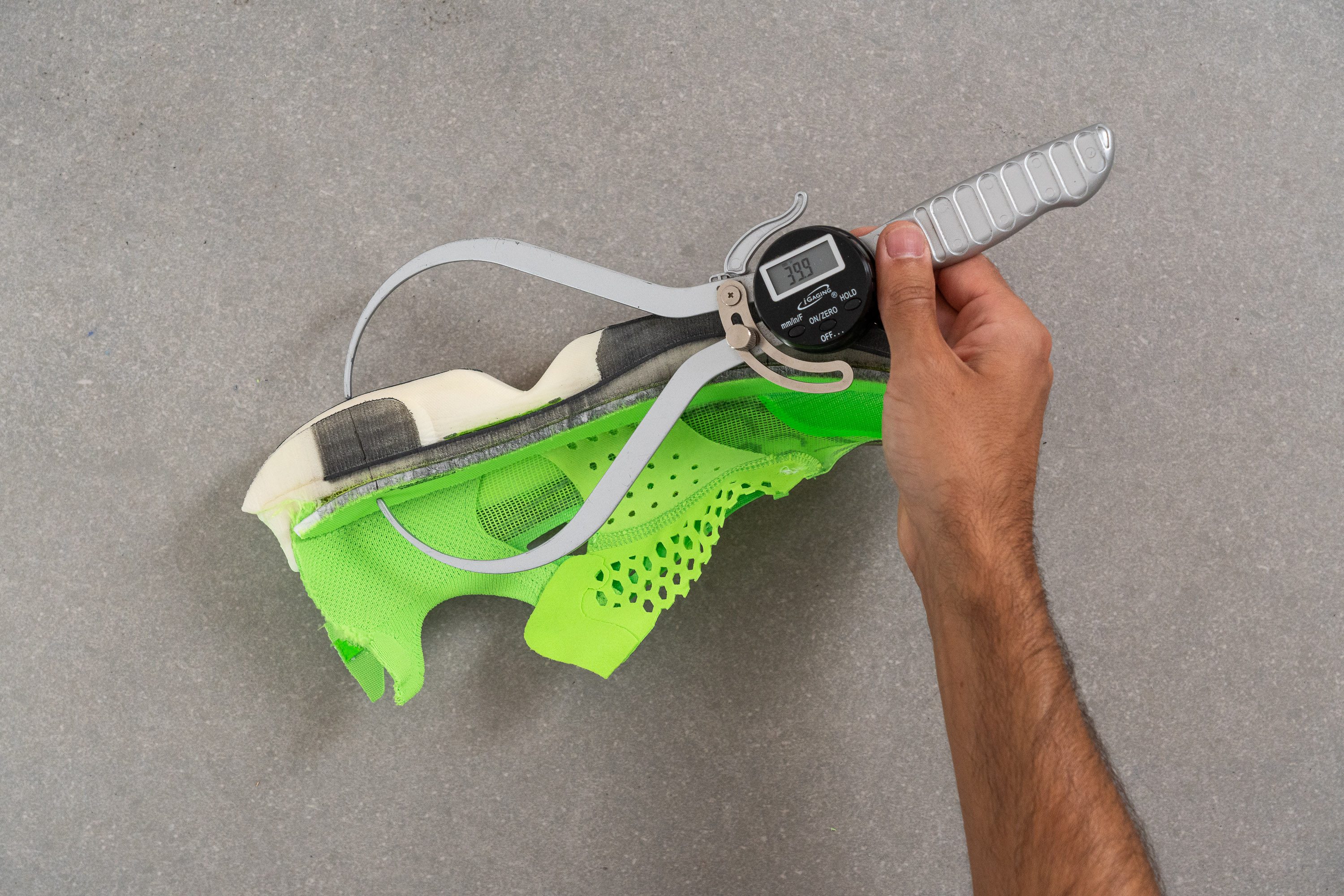
| Endorphin Elite | 39.9 mm |
| Average | 33.9 mm |
Forefoot stack
The shoe's forefoot also boasts impressive cushioning, making it a top pick for forefoot and midfoot strikers. When we took the measurement in our lab, we found that it clocked in at a cushy 31.9 mm.
Of course, expect zero ground feel from this racer.
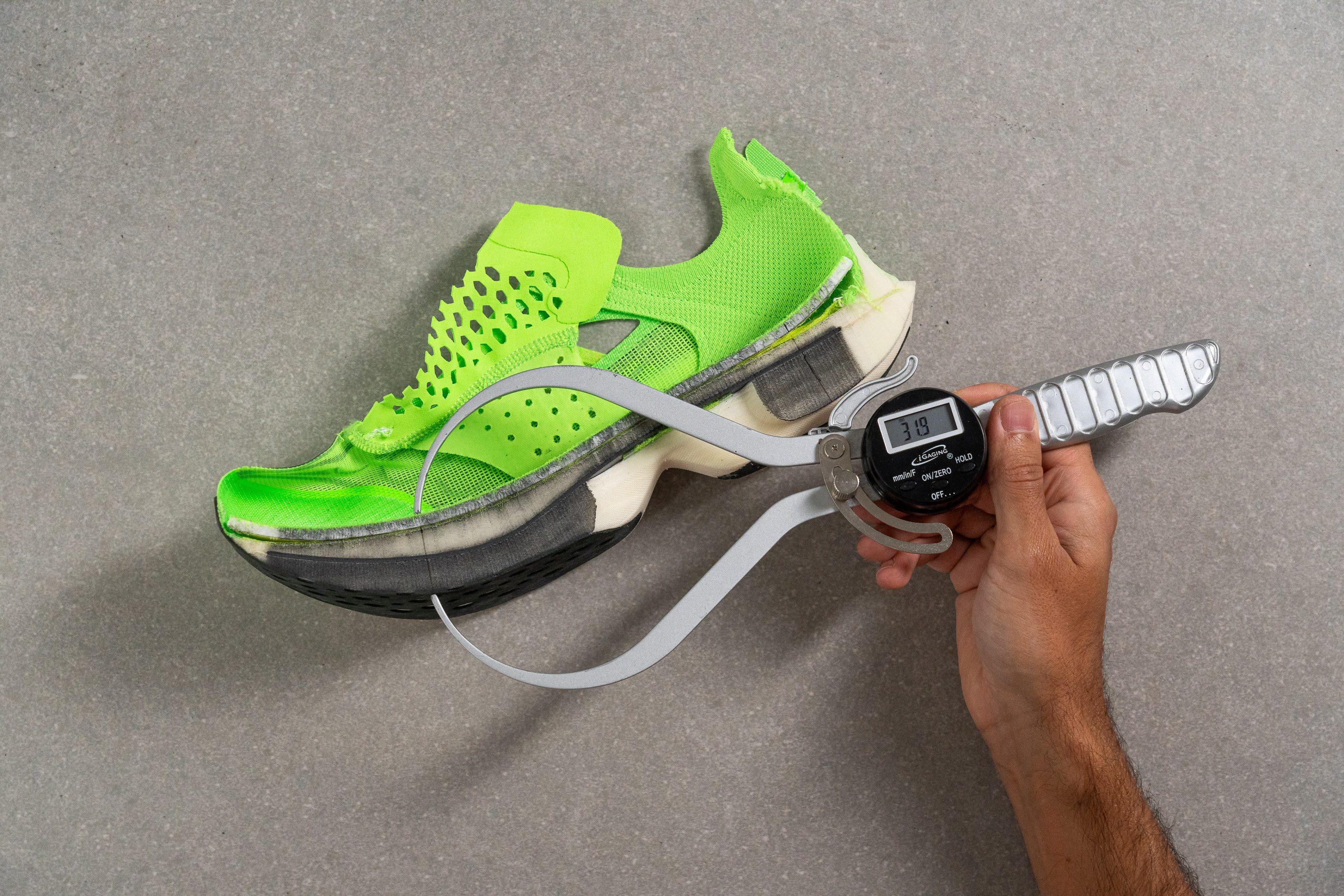
| Endorphin Elite | 31.9 mm |
| Average | 25.3 mm |
Drop
Boasting a classic 8.0-mm heel-to-toe drop, this shoe works great for all foot strikes.
We were also thrilled to discover that our measurement is spot-on with what the brand officially advertises, which is extremely rare! Kudos to Saucony for that.
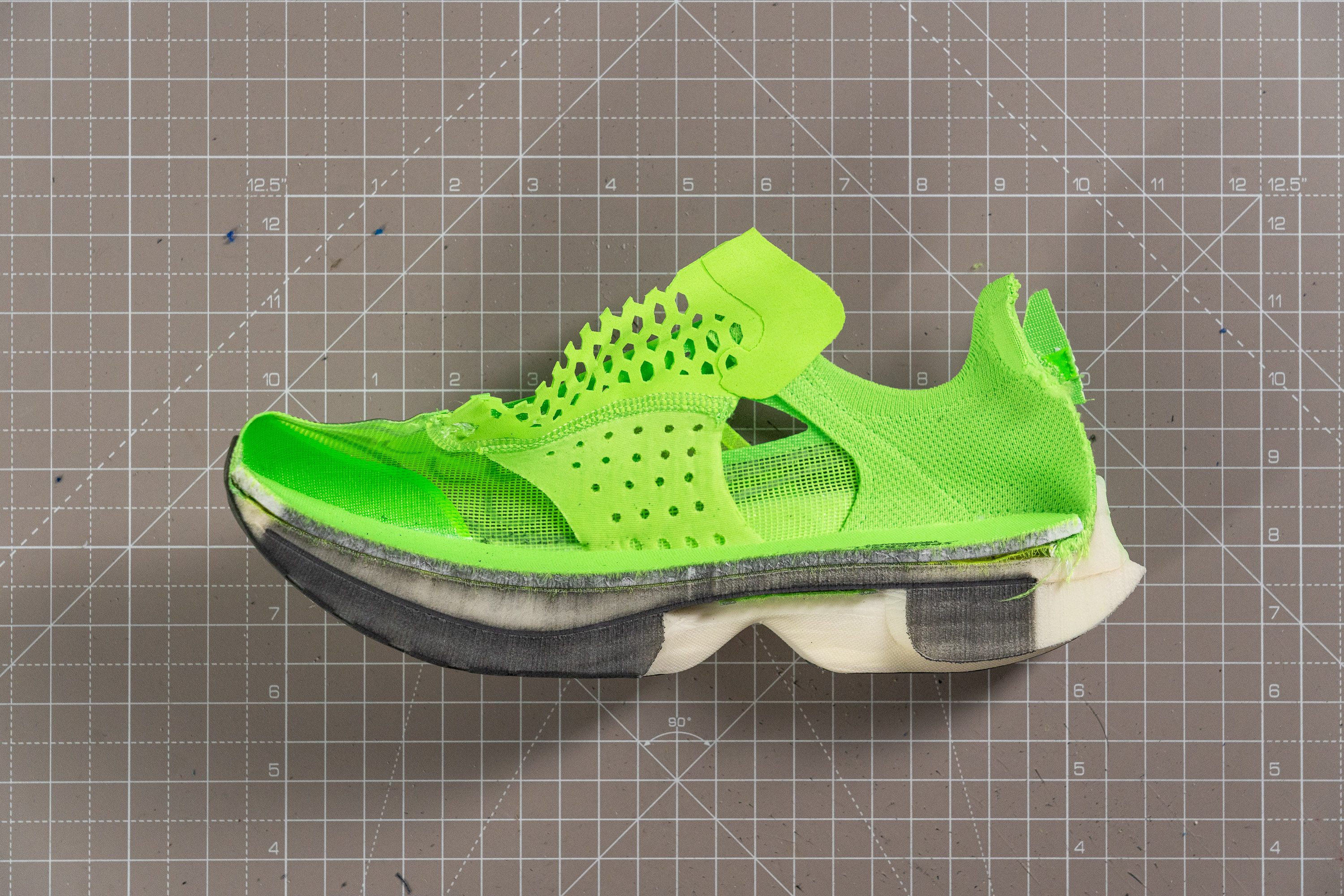
| Endorphin Elite | 8.0 mm |
| Average | 8.6 mm |
Insole thickness
The insole of this shoe is notably thick and cushioned. We discovered that it isn't just any ordinary, low-cost EVA insole like in most shoes.
Instead, it's crafted from PWRRUN PB—the same high-quality Pebax foam we've seen in other top-notch Saucony shoes like the Endorphin Speed 3. Such attention to detail is precisely what we anticipate when examining a shoe priced near 300 bucks.
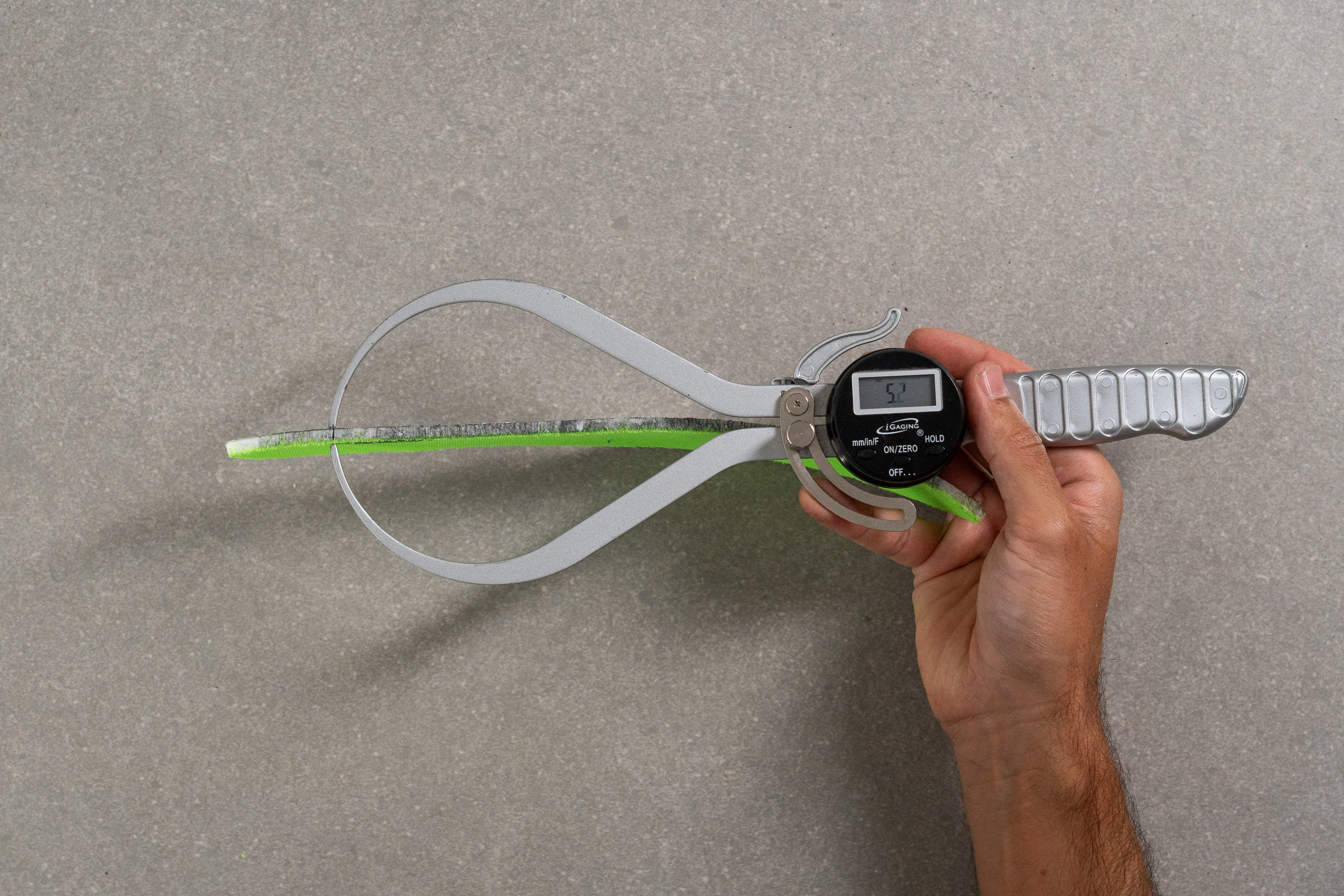
| Endorphin Elite | 5.2 mm |
| Average | 4.4 mm |
Midsole softness
While the shoe has a standout design, the real game-changer is the PWRRUN HG midsole. This is an evolution of the highly-praised PWRRUN PB. We found that it offers even better energy return, though it's a bit firmer underfoot.
The PWRRUN HG foam, still by Pebax, abandons the pellet-based structure of PWRRUN PB.
When we tested it in our lab, we measured the HG variant at 17.9 HA. This makes it 13% firmer than the PB version. So, if you're someone who enjoys a softer feel when you run, it's something to consider.
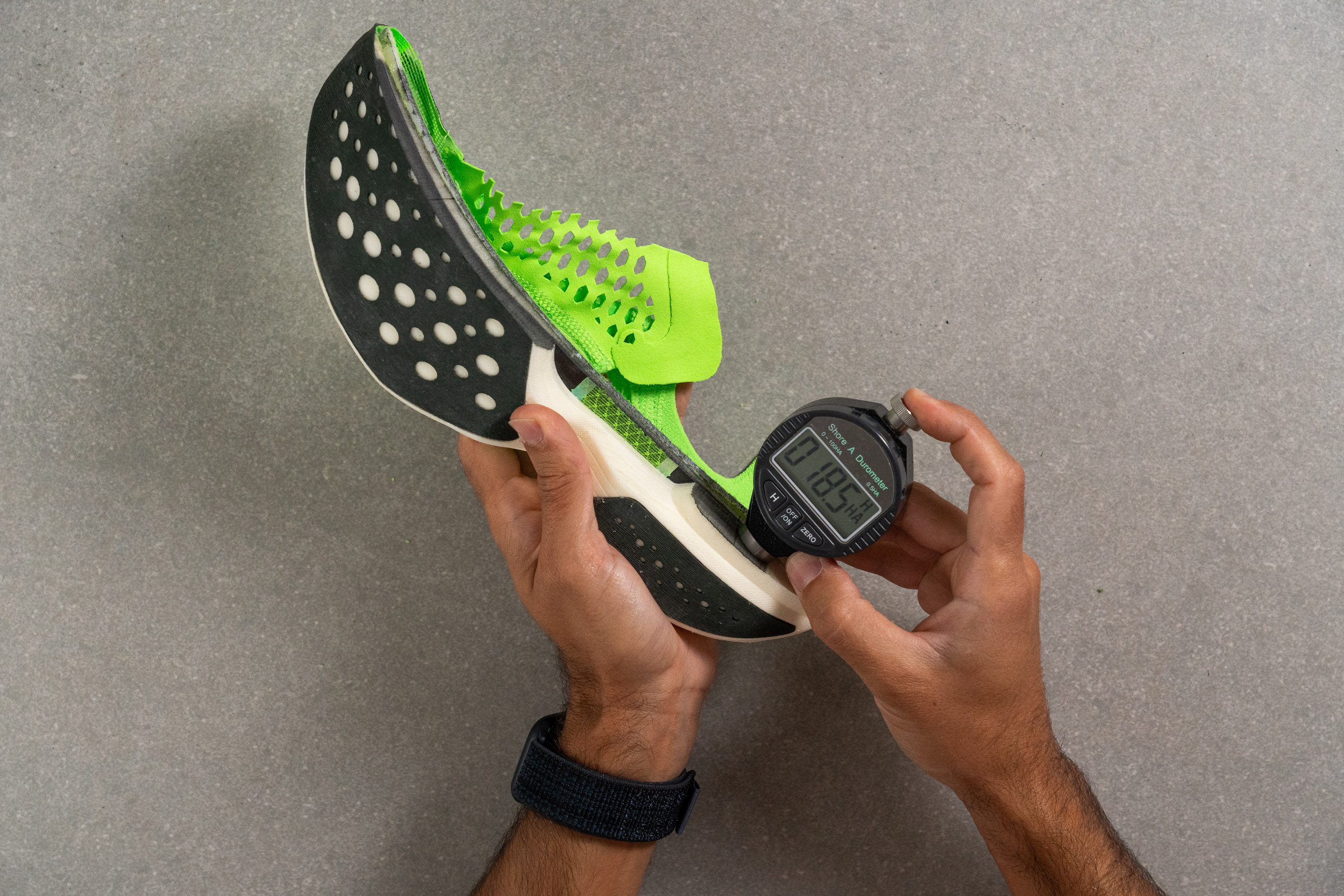
| Endorphin Elite | 17.9 HA |
| Average | 21.0 HA |
Difference in midsole softness in cold
After placing the shoe in the freezer for 20 minutes and then testing it, we found a measurement (21.0 HA) pretty similar to our earlier one.
There's just a 17.5% increase, which is better compared to many other running shoes. That's because PWRRUN HG, given it's a Pebax-based foam, excels in colder temperatures.
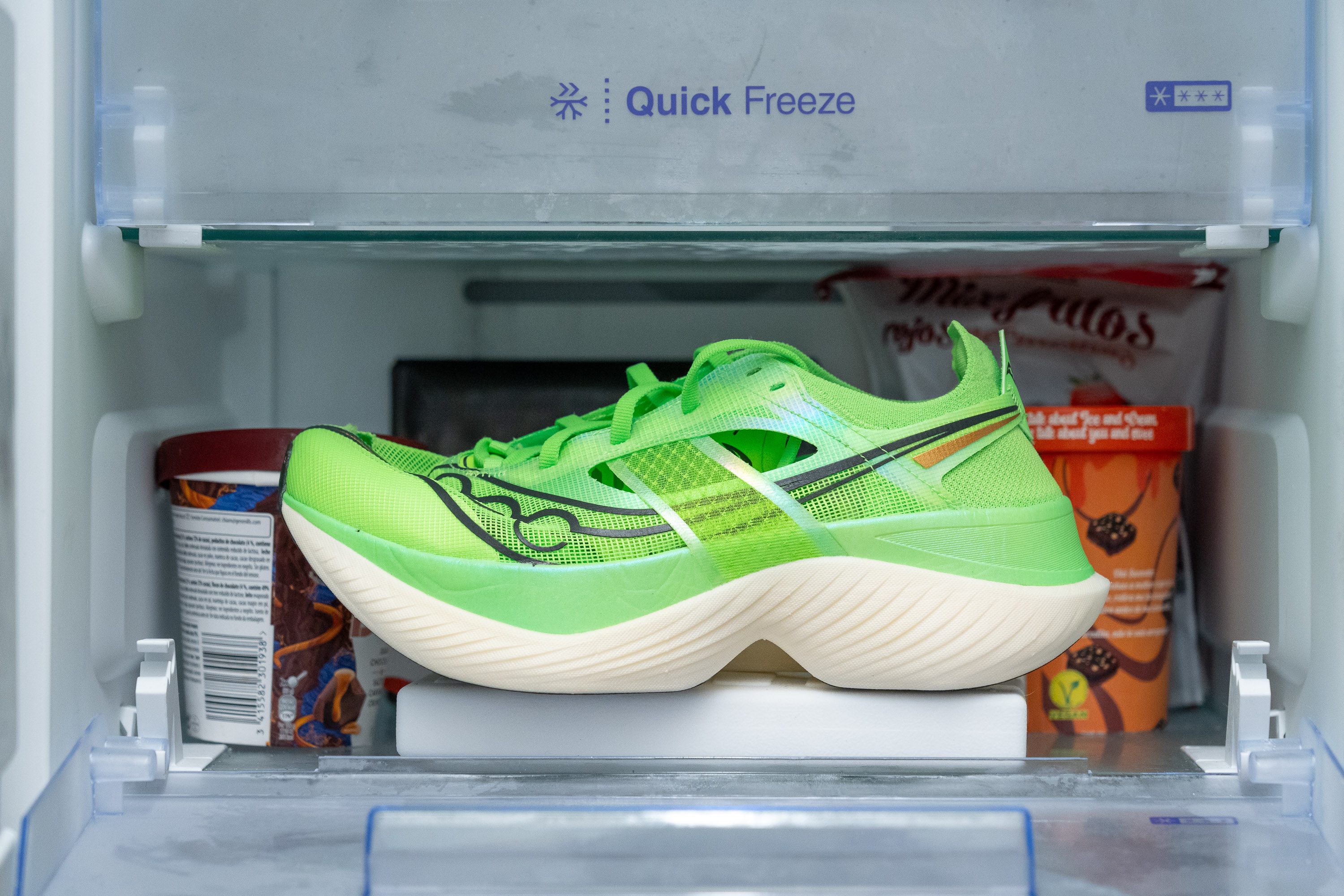
| Endorphin Elite | 17.5% |
| Average | 25.2% |
Stability
Lateral stability test
Even though some runners lean towards softer foams, there's an undeniable advantage in a slightly firmer compound—it offers enhanced stability.
And this is precisely what PWRRUN HG provides: an impressively stable experience even for a max-stack height supershoe.
Torsional rigidity
Naturally, being a top-tier supershoe, the Elite features a stiff carbon plate embedded in the midsole. This not only provides a bouncy feel but also gives top-notch torsional rigidity.
In our lab tests, we rated it with 5 out of 5. Good luck trying to twist it.
| Endorphin Elite | 5 |
| Average | 3.3 |
Heel counter stiffness
While there isn't a classic heel counter, an extension of the overlay wraps around to form a heel collar. However, don't anticipate much support there; we gave it a score of 1 out of 5.
Essentially, you won't receive any added support in the heel area.
| Endorphin Elite | 1 |
| Average | 2.8 |
Midsole width in the forefoot
When we examined the midsole width, we discovered that the forefoot is exceptionally wide at 118.3 mm.
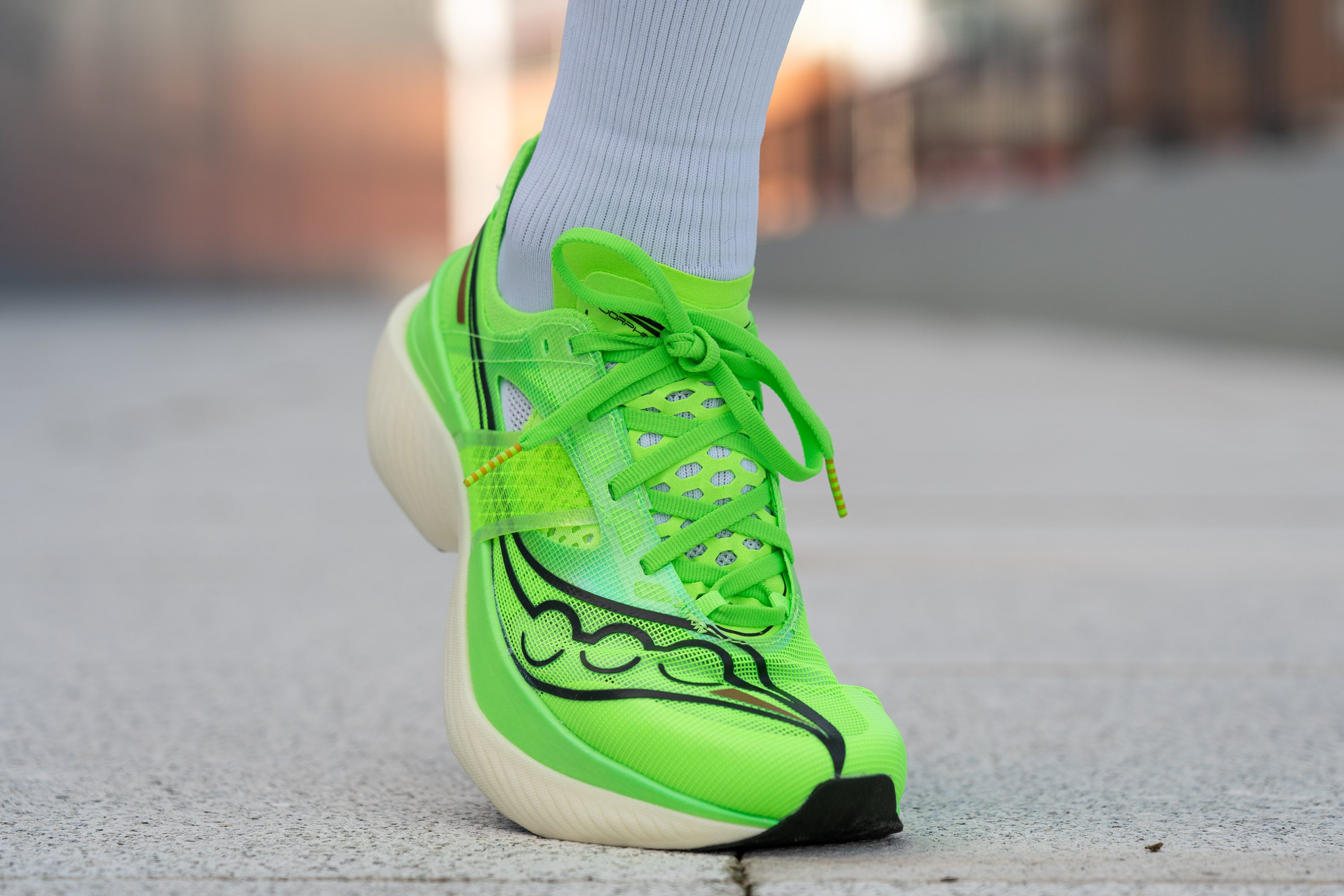
This design choice seems aimed at enhancing stability for midfoot and forefoot strikers, especially given the shoe's tall and aggressive profile.
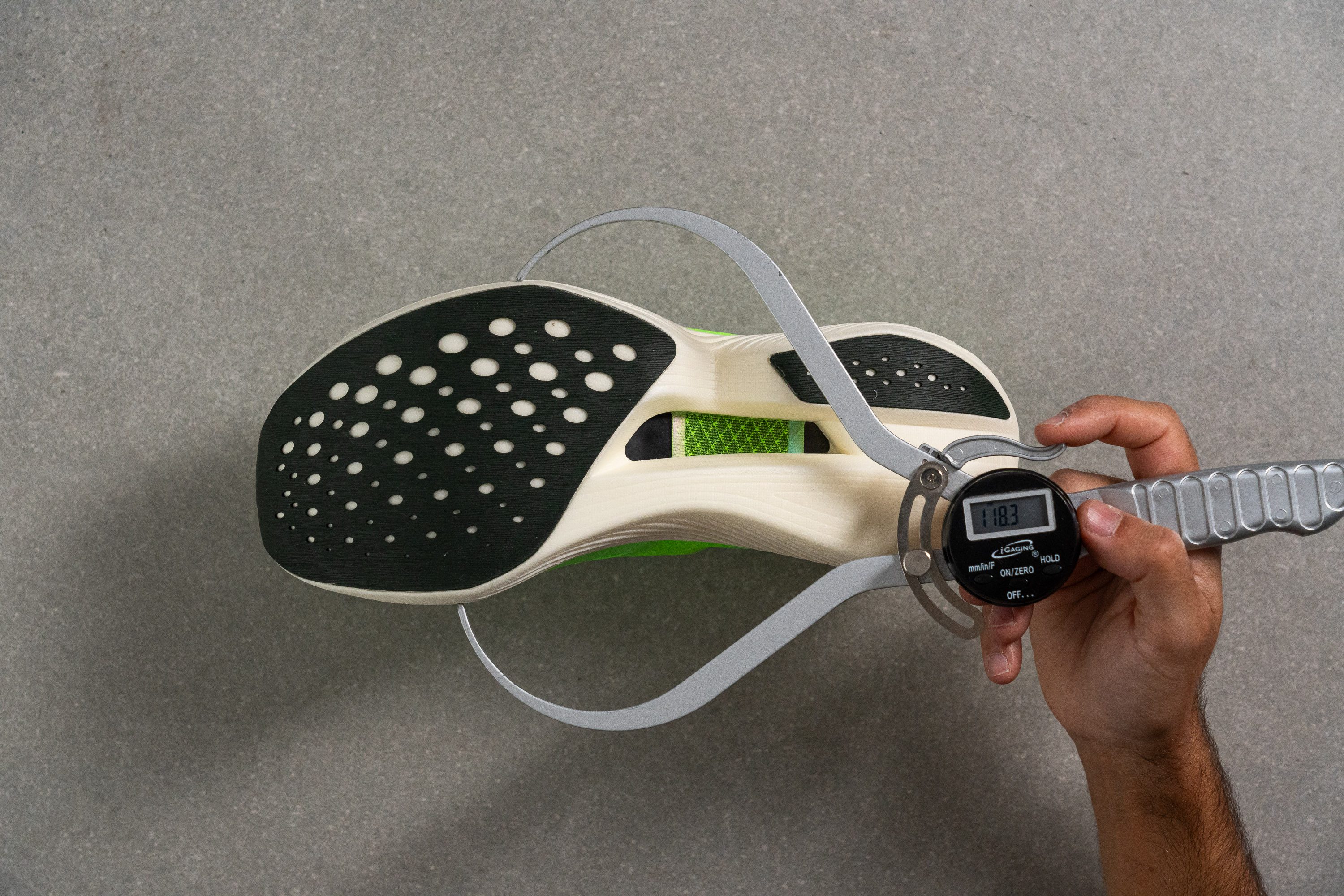
| Endorphin Elite | 118.3 mm |
| Average | 113.9 mm |
Midsole width in the heel
The design of the heel is different, and there's a logical reason for that.
In our section discussing the outsole, we clarified that the Elite isn't tailored for heel strikers. Thus, widening the heel would only add unnecessary weight without benefiting its intended users.
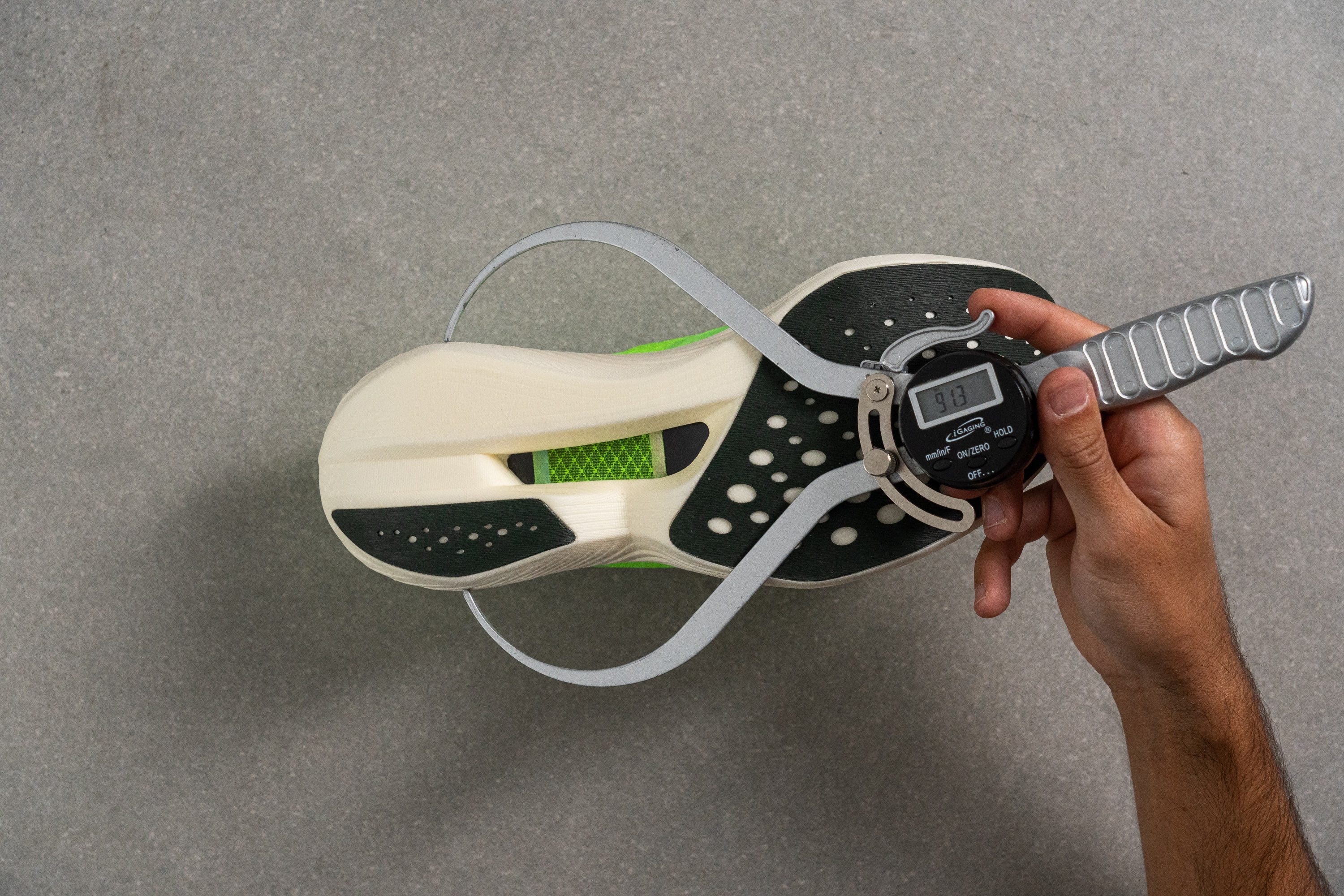
| Endorphin Elite | 91.3 mm |
| Average | 90.5 mm |
Flexibility
Stiffness
While shoes with carbon plates are usually stiff, the Endorphin Elite stands out as one of the stiffest we've measured. In our test, we found that it required 64.5N of force from us to bend the shoe to a 90-degree angle.
| Endorphin Elite | 64.5N |
| Average | 28.8N |
Difference in stiffness in cold
After a 20-minute freezer-chill, we retested the shoe and noticed a noticeable increase in stiffness—it now took 77.5N of force!
We measured a 20.1% increase.
Just as we observed with the midsole's softness, the PWRRUN HG foam demonstrated how well Pebax can handle temperature changes.
| Endorphin Elite | 20.1% |
| Average | 34.9% |
Size and fit
Internal length
We recorded the internal measurement at 261.3 mm, which came in shorter than anticipated (270 mm).
However, since this is a racing shoe, we expected a snugger fit. It feels true-to-size for us, but if you have wider feet and/or you're getting ready for a marathon, consider going half-size up.
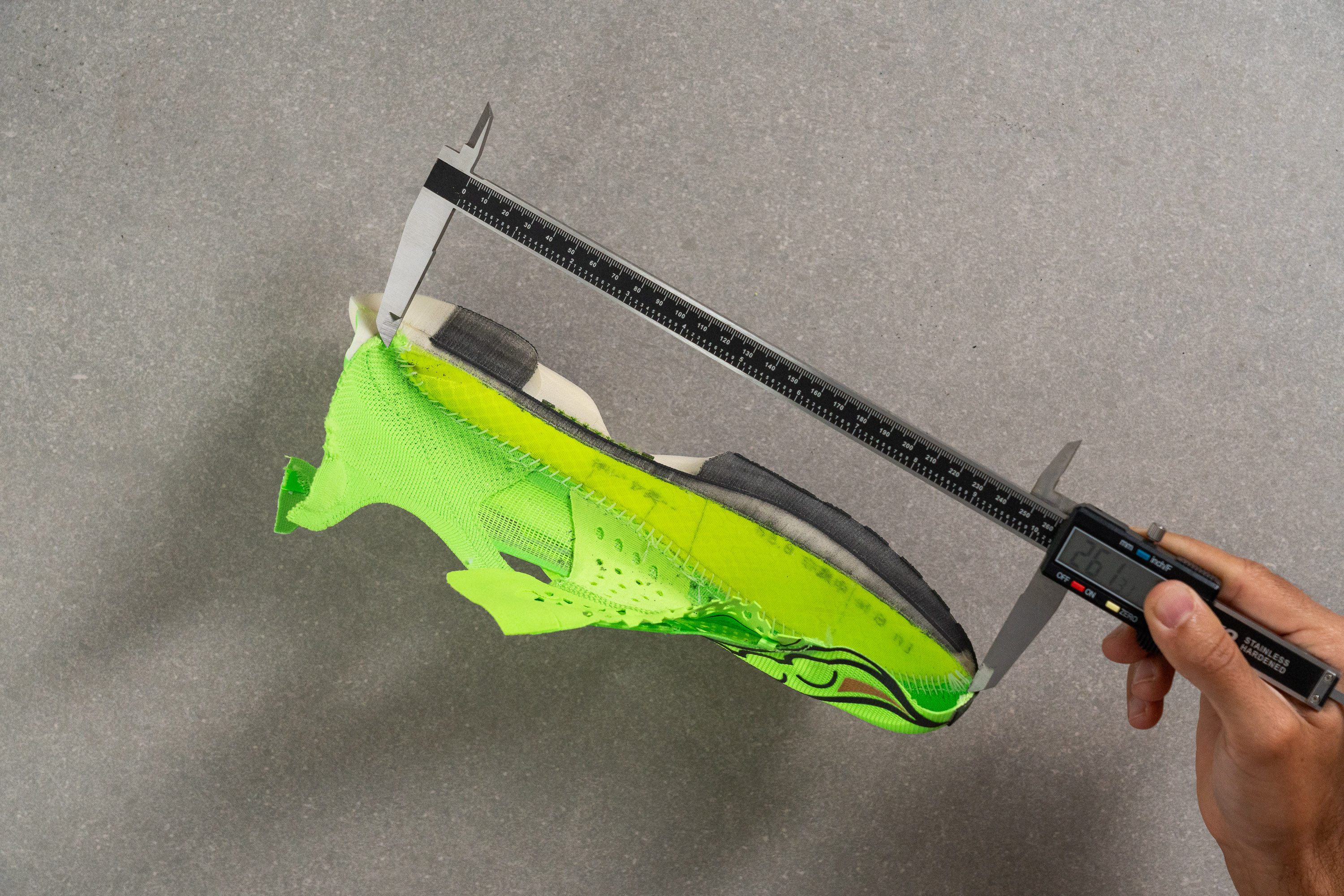
| Endorphin Elite | 261.3 mm |
| Average | 269.2 mm |
Toebox width at the widest part
The Endorphin Elite, measuring 99.6 mm at the widest part of the upper, offers a way roomier toe box than the 94.3 mm Endorphin Pro 3.
This design makes it a top choice for runners with medium-to-wide feet, especially for longer races.
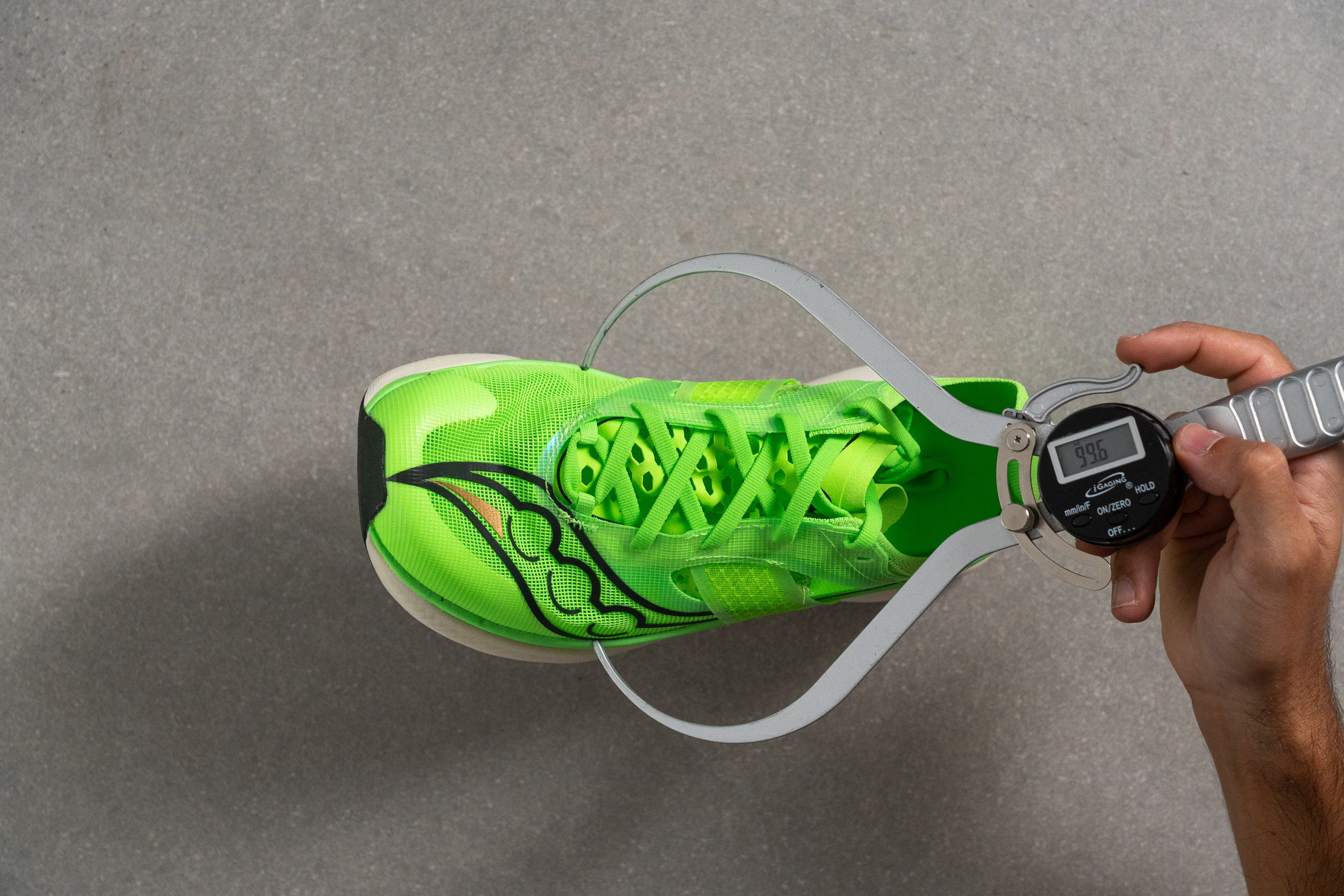
| Endorphin Elite | 99.6 mm |
| Average | 98.4 mm |
Toebox width at the big toe
The big toe area stands out as a fantastic showcase of spaciousness in a racing shoe design. We recorded an impressive 79.1 mm at this spot, which is remarkably generous.
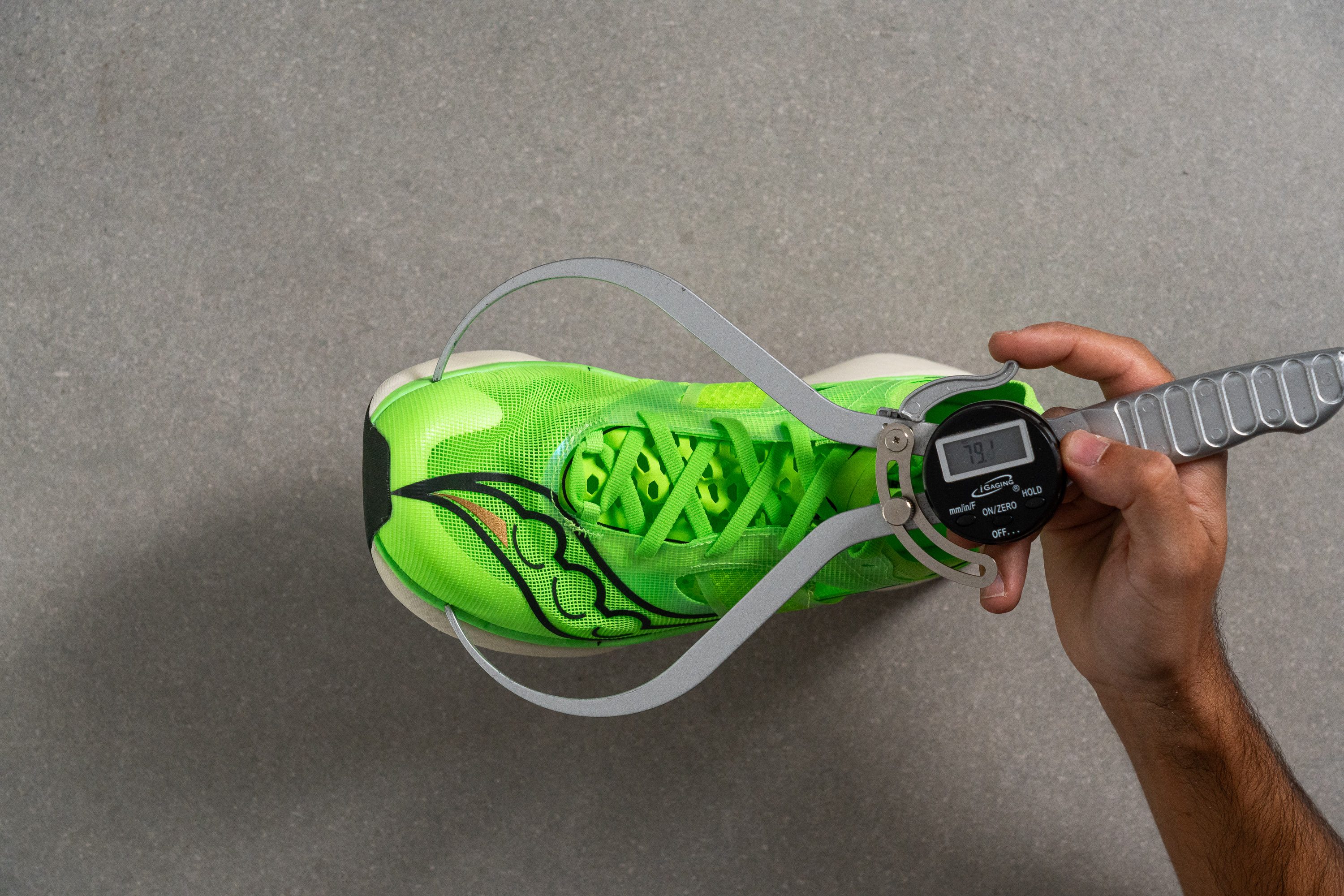
| Endorphin Elite | 79.1 mm |
| Average | 78.3 mm |
Tongue: gusset type
The shoe features a semi-gusseted tongue that enables a perfect lockdown.
While many running shoe designers often prefer non-gusseted tongues for racing shoes to save weight, this isn't the approach here. Well done, Saucony.
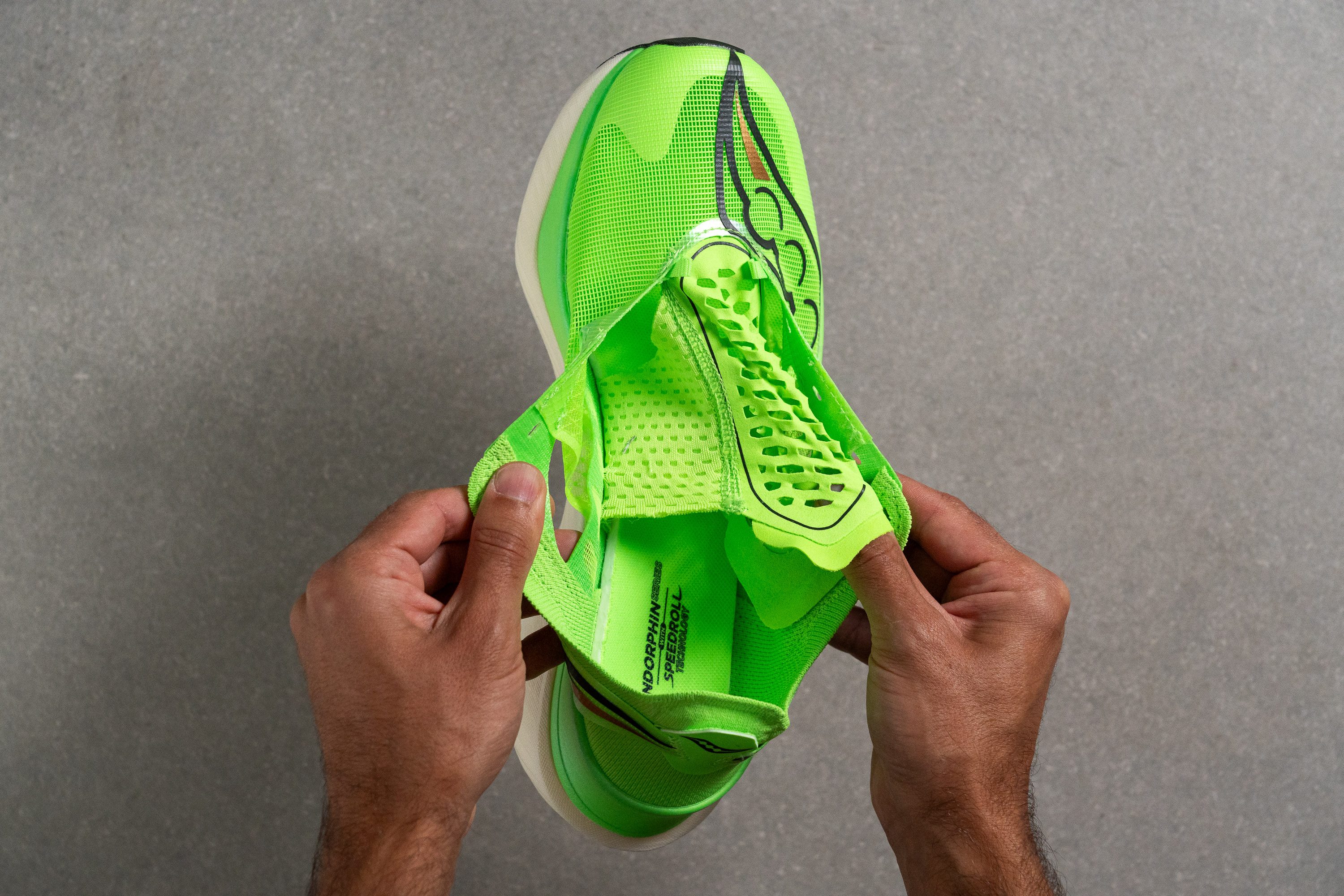
| Endorphin Elite | Both sides (semi) |
Comfort
Tongue padding
With a razor-thin 0.9 mm measurement and dozens of cutouts, this out-of-this-world tongue is all about weight-saving.
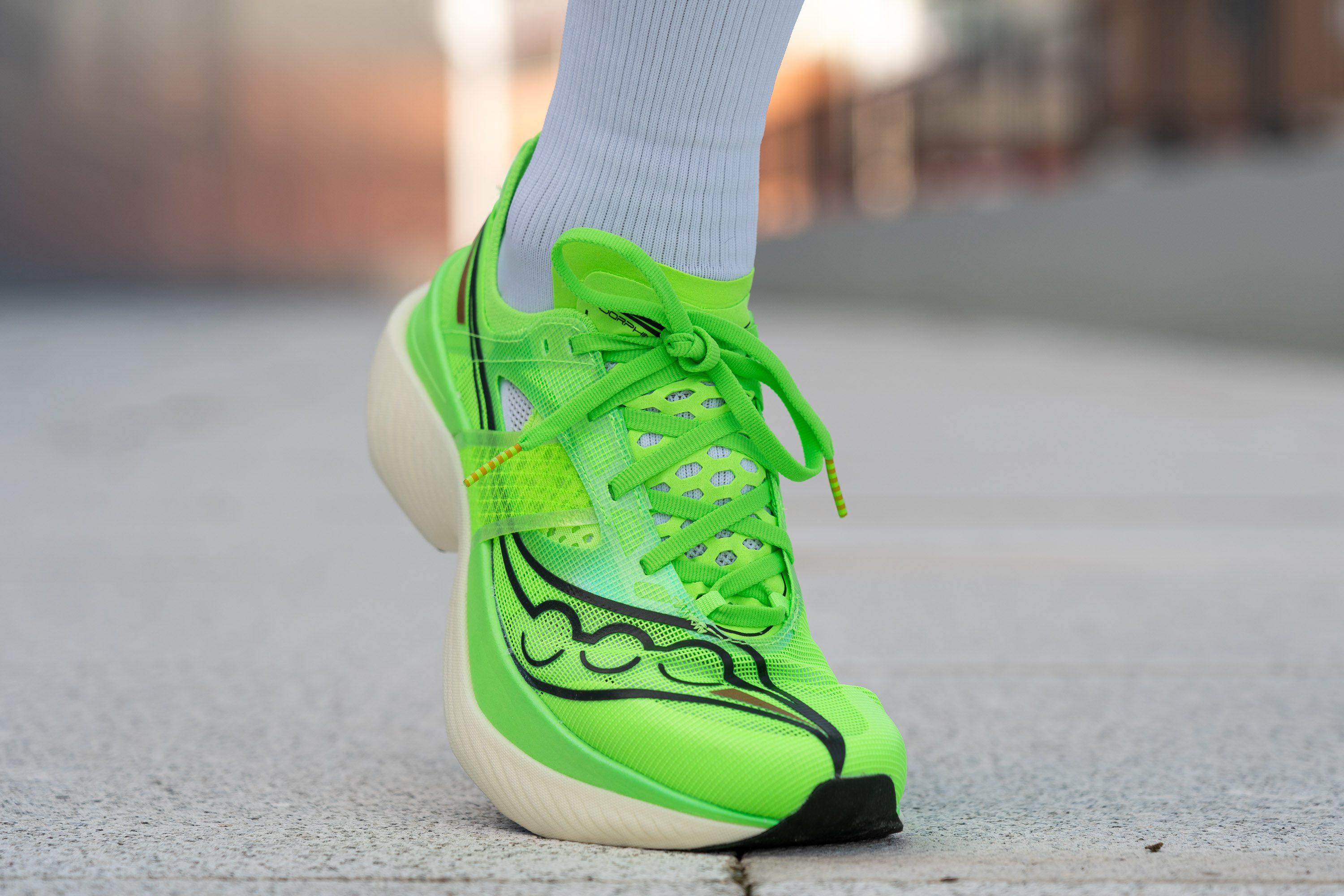
It offers no padding and minimal thickness—it's like the comfort experience we'd expect in fighter jet. And we love it!
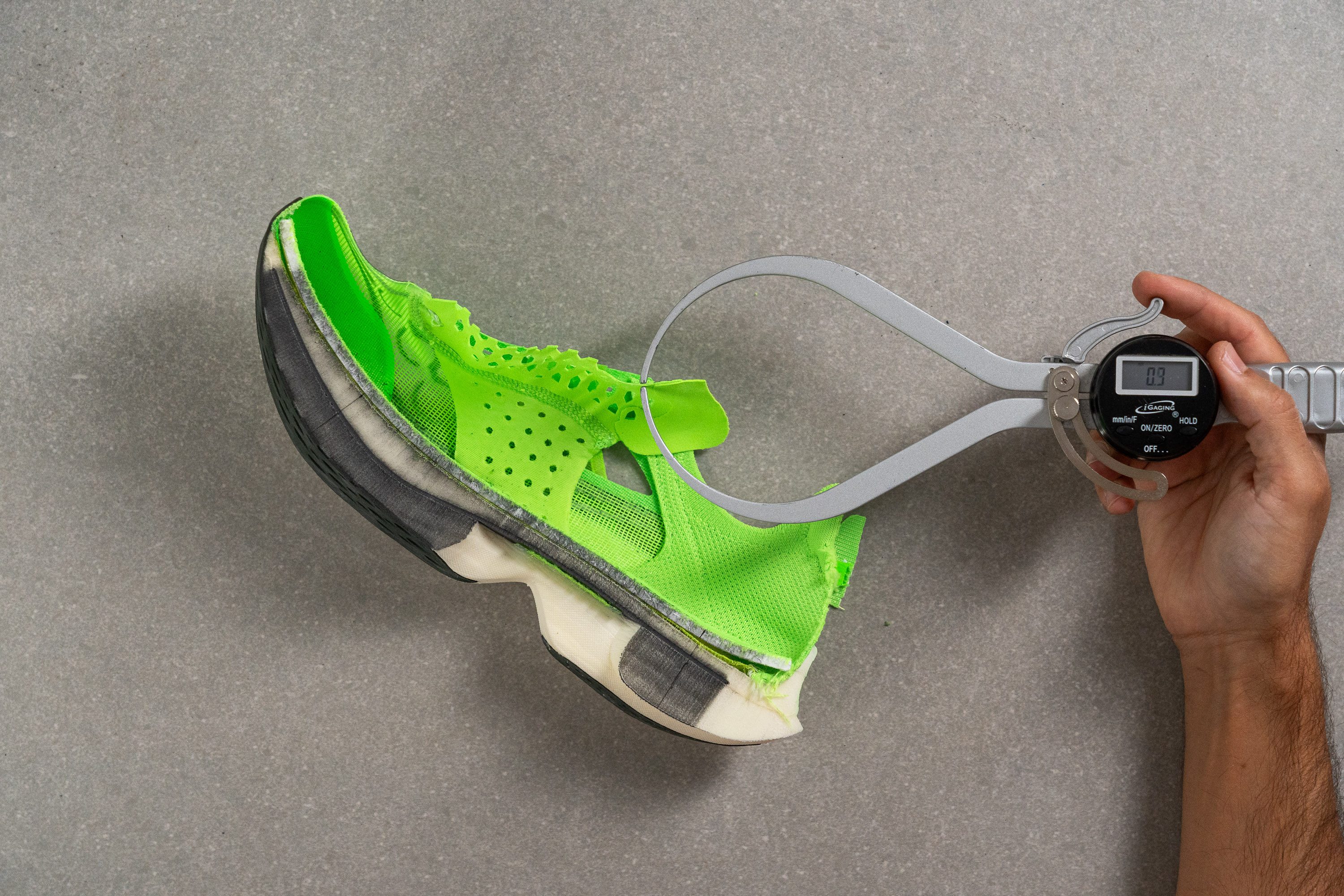
| Endorphin Elite | 0.9 mm |
| Average | 5.7 mm |
Heel tab
Slipping our feet into competition shoes has become increasingly challenging over the years. So, it came as no shock when the Endorphin Elite gave us a similar tight-fitting experience with its unique upper.
Thankfully, Saucony added a user-friendly pull-tab to make the process smoother.
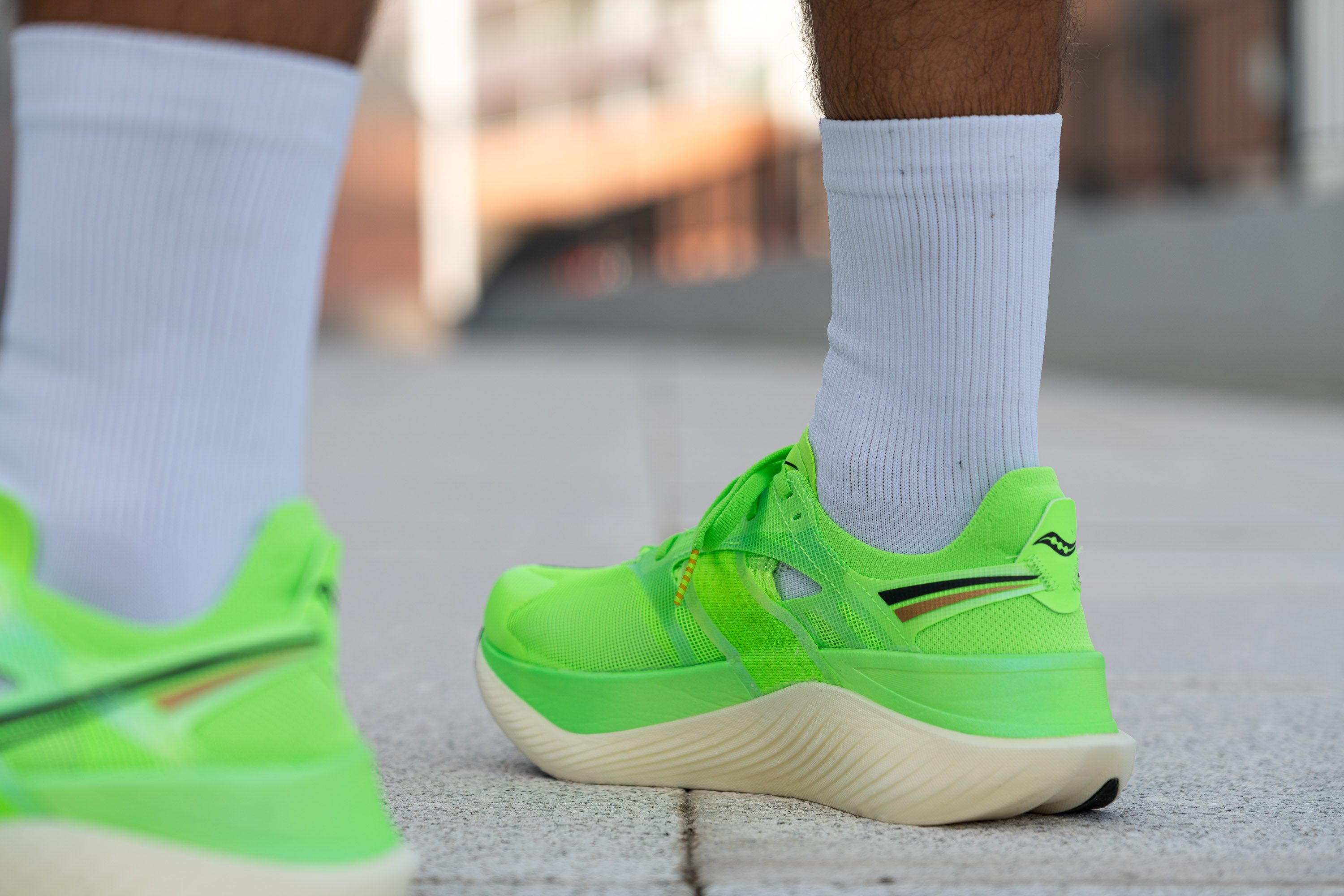
| Endorphin Elite | Pull tab |
Removable insole
Unlike some racing shoes from other brands, the insole in this one isn't glued down. This allowed us to switch it out with an insole from another shoe.
Yet, based on our tests here in the lab, the optimal running experience in this model comes when using the original insole.
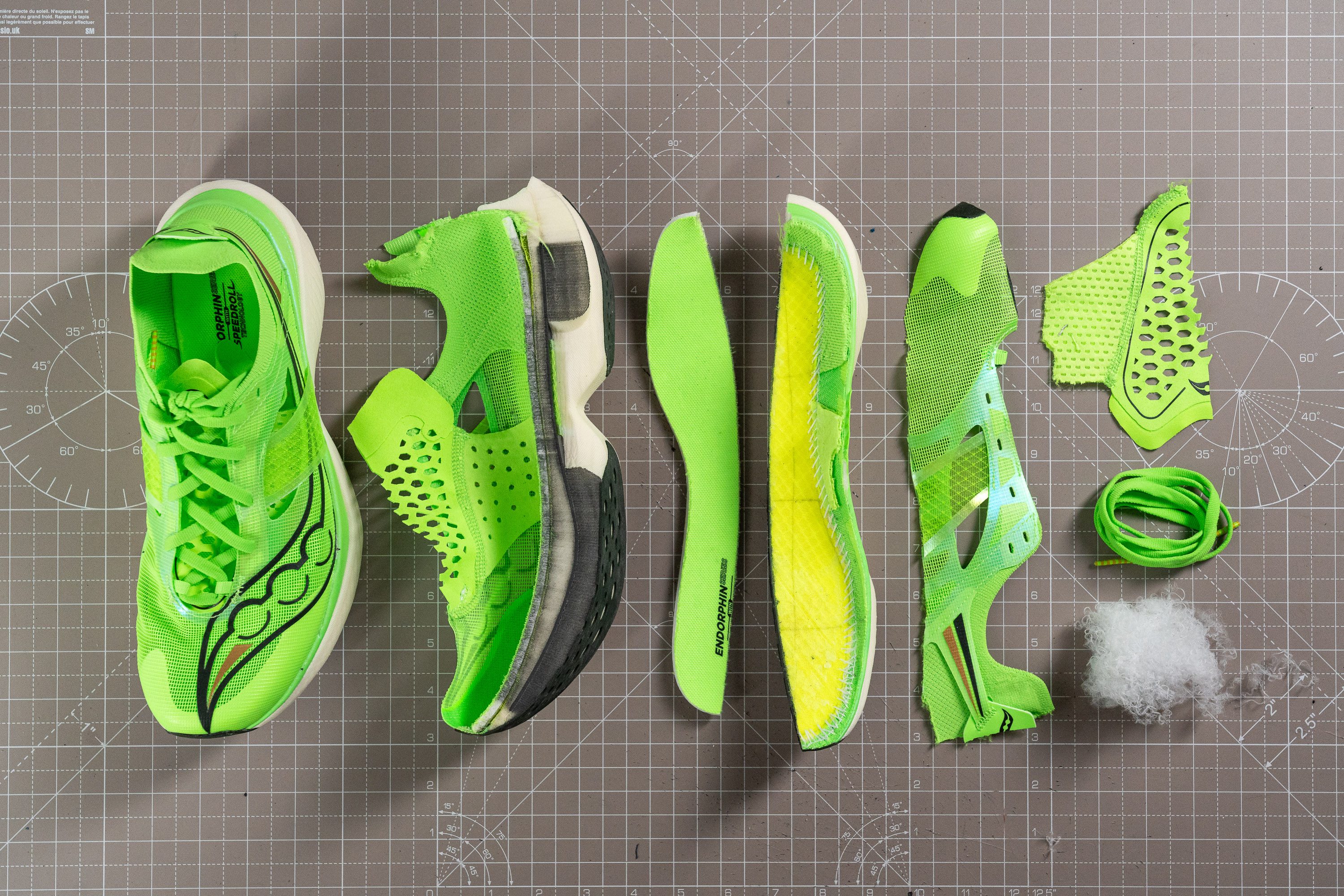
| Endorphin Elite | Yes |
Misc
Reflective elements
We understand that most races take place in daylight and under controlled traffic conditions. Given these factors, it makes sense for Saucony to leave out reflective elements in the Endorphin Elite.
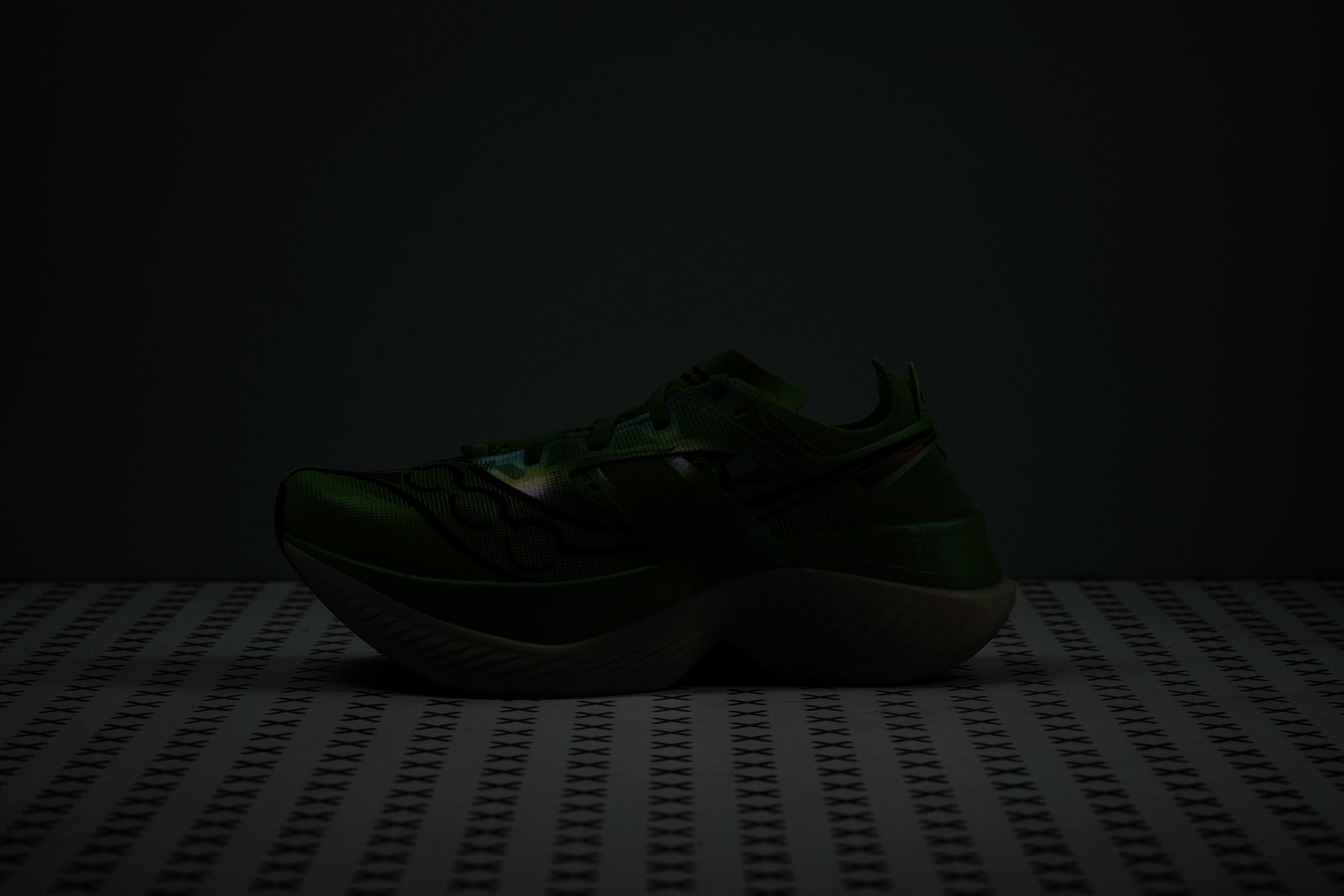
| Endorphin Elite | No |

